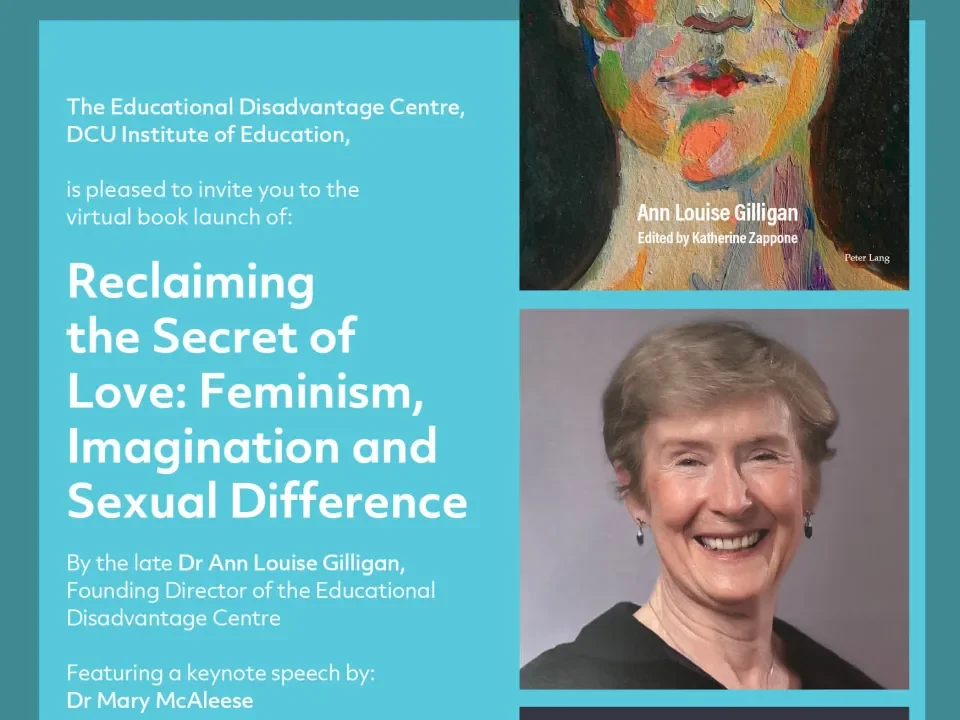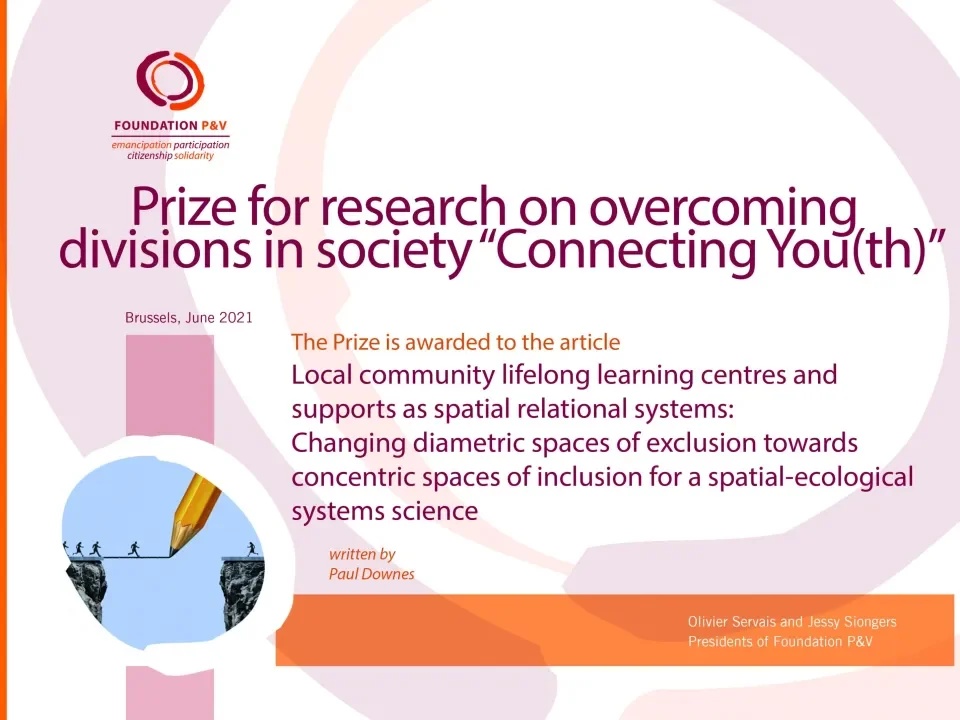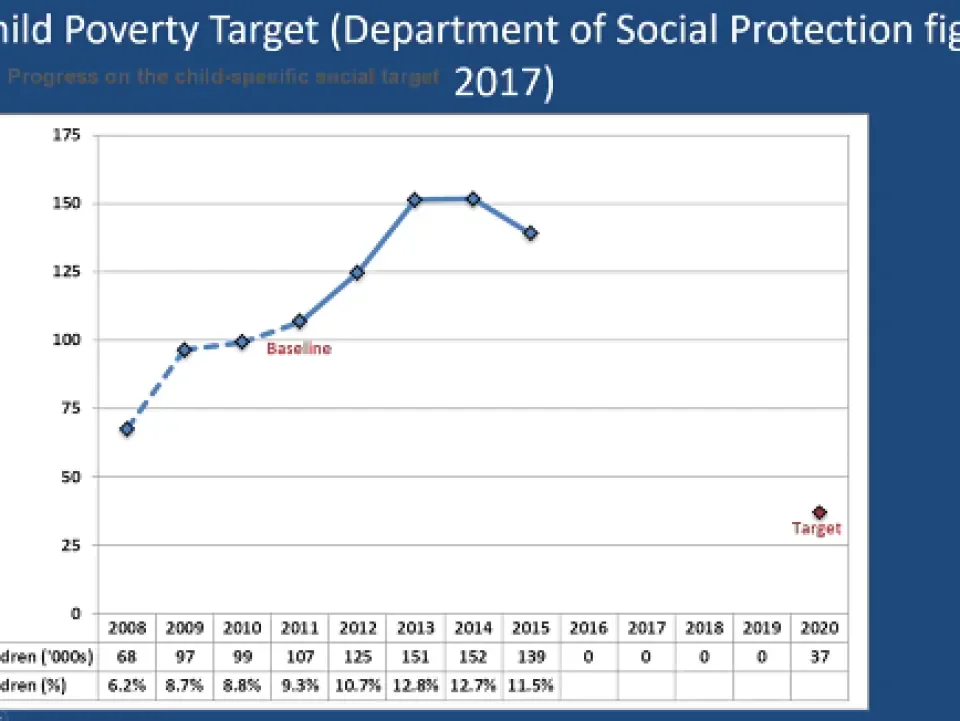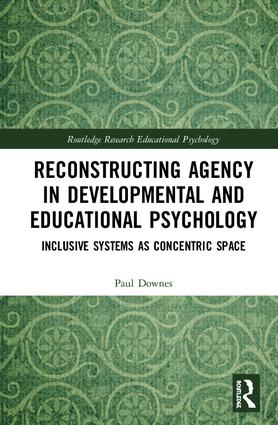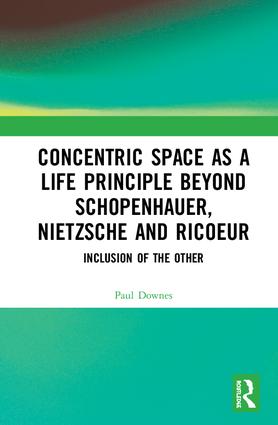
EDC News 2022 / 2021 / 2020 / 2019
2022 News
EDUCATIONAL DISADVANTAGE CENTRE, FORUM, RESILIENT, INCLUSIVE SYSTEMS FOR VULNERABLE GROUPS: KEY AREAS FOR DEVELOPMENT IN THE NEW NATIONAL CHILDREN’S POLICY FRAMEWORK
The Educational Disadvantage Centre, Institute of Education, DCU is hosting a Forum, Resilient, Inclusive Systems for Vulnerable Groups: Key Areas for Development in the new National Children’s Policy Framework on the St. Patrick's Campus on April 27th 2022, 5pm, E214.
Keynote Speaker: Professor Michael Ungar, Canada Research Chair in Child, Family and Community Resilience, Dalhousie University, Nurturing Resilience through a Strong Community.
The panel of respondents will include: Professor Sheila Greene, ProChancellor Trinity College Dublin and Tanya Ward, CEO, Children's Rights Alliance
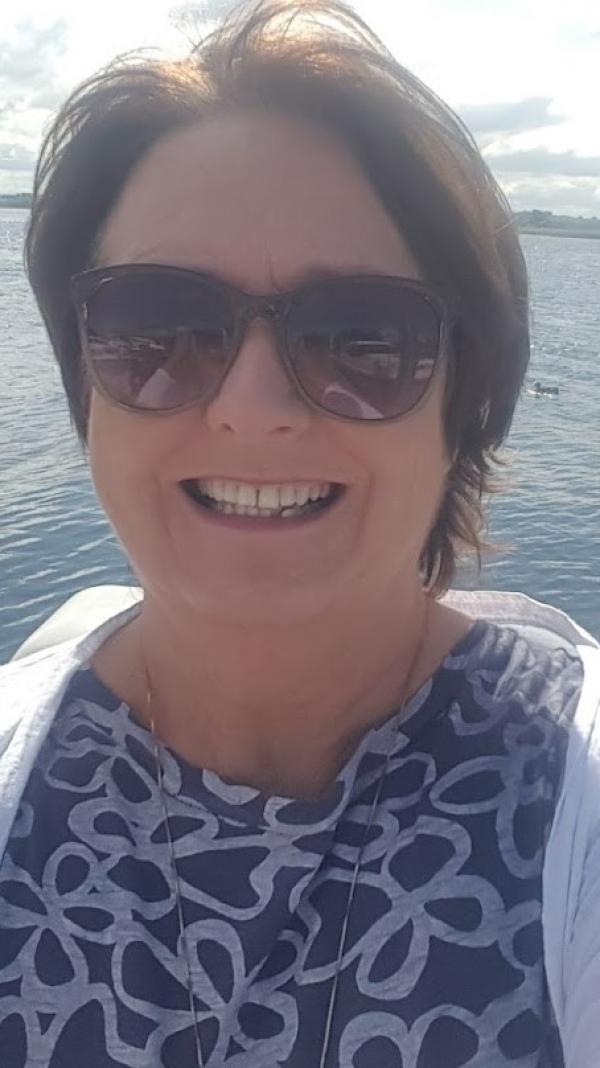
Valerie McLoughlin
RETIREMENT OF VALERIE MCLOUGHLIN, EDC ADMINISTRATOR
Warm congratulations to Valerie McLoughlin on her retirement after 16 years working as the Administrator of our Educational Disadvantage Centre. Among her various activities in her role with our Centre, Valerie has served as Chairperson of the Local Management Committee of Ballymun Anseo School Completion Programme, Ballymun Whitehall Area Partnership Education Working Group and the Traveller Education Network.
She has led the organisation of a range of large scale events hosted by our Centre, has co-authored reports in the areas of lifelong learning and afterschool projects, while leading the development of the Centre's Website and Resource library. Her work has also included being Coordinator of the Centre's Sport 4 Success Afterschool Club, our Challenger Programme Maths and Irish Support Groups and Tusla Emergency Accommodation Homework Clubs. We wish her a happy and healthy retirement, and greatly thank her for her service. Best wishes, warmest regards Valerie!
NATIONAL WORKING GROUP FOR A NATIONAL STRATEGY FOR THE ARTS AND SOCIAL INCLUSION IN EDUCATION
A National Working Group for a National Strategy for the Arts and Social Inclusion in Education has recently been established by DCU's Educational Disadvantage Centre. The Group is composed of key leaders in the Arts and Social Inclusion in Education sectors.
The National Working Group has published an agreed document, Key Dimensions of a National Strategic Commitment to the Arts for Social Inclusion, involving Afterschool Services for Marginalised Groups: The Case for a National Strategy for the Arts and Social Inclusion in Education?
Members of the Working Group who have co-authored the discussion document are as follows:
Professor Paul Downes, Director, Educational Disadvantage Centre, Professor of Psychology of Education, DCU Institute of Education
Noeleen Hartigan, Independent Strategy Consultant
Colm Ó Cuanacháin, Fighting Words
Olwen Dawe, Independent Strategy Consultant
Elaina Ryan, Director Children's Books Ireland
Saoirse Brady, Children's Rights Alliance
Professor Deborah Kelleher, Director of Royal Irish Academy of Music
Moira Leydon, ASTI
Aideen Howard, Director, The Ark
Mark O'Brien
Gina O'Brien, Forsa
Orla Doyle & Michael Kennedy, St Vincent’s Boy’s Infant School, Dublin 1 (DEIS)
Clive Byrne, Dermot Carney, Paul Byrne & Paul Crone, National Association of Principals and Deputy Principals (NAPD)
Ciara Naughton, O’Connell’s Primary School/St Vincent’s Boys’ Infant School HSCL
Dr Siobhan O'Reilly, Fiona Kearney & Alan Tully, Familibase, Ballyfermot
Dr Sylwia Kazmierczak, Cabra School Completion Programme
Liz Coman
Seána Brady, Sinead Crosson & Lauren O’Callaghan, Central Model Senior School, Dublin 1 (DEIS)
Jennifer Cummins, Ballymun Anseo School Completion Programme
Alison Rafferty, Central Model Infant School, Dublin 1 (DEIS)
Cait Ni Mhurchu, Kilkenny School Completion Programme
Denise McCormilla, CEO, National Childhood Network
Dr Irene White, DCU Institute of Education
Bronagh Fagan, DCU Educational Disadvantage Centre
Sophia Cuddy Cullen, St Laurence O’Toole National School, Dublin 1 (DEIS)
Rose Duffy, Fionnuala Sinnott & Megan Wynne, Rutland National School, Dublin 1 (DEIS)
The discussion document has been submitted to the Minister for Tourism, Culture, Arts, Gaeltacht, Sport and Media, Catherine Martin and to Creative Ireland. A meeting was held with the Minister and Tania Banotti, CEO Creative Ireland in July 2021 to discuss the then draft discussion document in order to develop future policy initiatives in this area.
INTERVIEW WITH PROFESSOR PAUL DOWNES WITH THE GOOD INFORMATION PROJECT: NOTEWORTHY
The Journal.ie Wednesday February 2nd 2022
Increased State spend on childcare 'not enough' to solve crisis for parents and providers. READ MORE
CATCHING UP AT SCHOOL AFTER COVID: HOW FAR BEHIND IS YOUR CHILD – AND IS THERE ANYTHING YOU CAN DO AT HOME TO HELP?
Irish Independent January 19th 2022
Focussing too much on how far children may have fallen behind can add to their anxiety, writes Tanya Sweeney. READ MORE and ACCESS PDF HERE
2021 News
UNICEF REPORT ON WELLBEING AND EUROPEAN CRIME PREVENTION NETWORK AWARD
Professor Paul Downes is an advisor to the UNICEF report, What makes me? Core capacities for living and learning, published in the last week of December 2021.
He was also a judge for the European Crime Prevention Network Award announced in early December. READ MORE
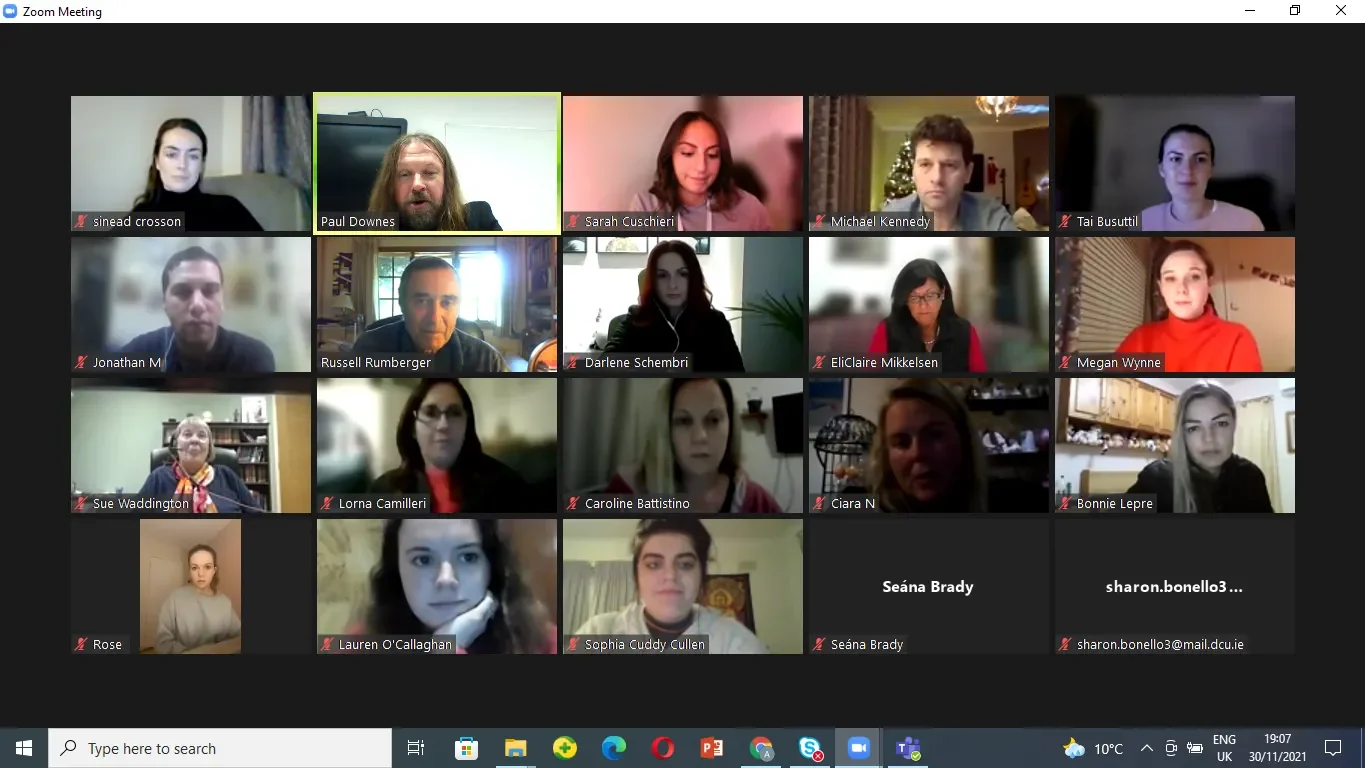
Webinar on Lifelong Learning and Early School Leaving
WEBINAR ON LIFELONG LEARNING AND EARLY SCHOOL LEAVING: SUSAN WADDINGTON AND PROFESSOR RUSSELL RUMBERGER
Our warm thanks to both Susan Waddington, President of the European Association for the Education of Adults, (2008-2013). Inductee into the International Hall of Fame for Adult Educators (2016) and Professor Russell Rumberger, Professor Emeritus in the Gevirtz Graduate School of Education at the University of California, Santa Barbara, for their webinar on November 30th with our Centre's North East Inner City (NEIC) Fellowship and Maltese Education Ministry Fellowship M.Ed Students.
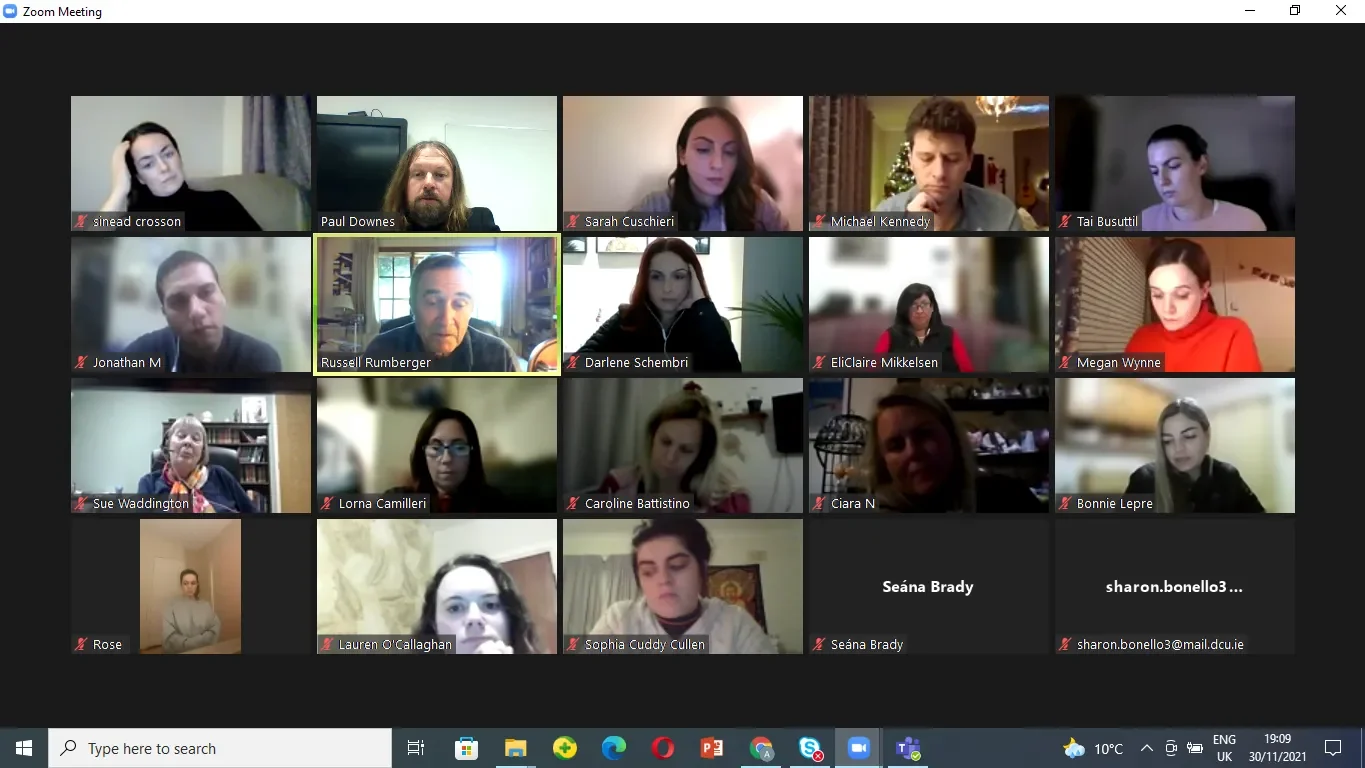
Webinar on Lifelong Learning and Early School Leaving
Susan Waddington reflected on her life and work in adult education pointing to key learning and future issues for concern. Professor Russell Rumberger discussed his life and work on early school leaving offering reflections on key priorities at different system levels for future development. Both Susan and Russell are members of the Educational Disadvantage Centre's International Advisory Board

Dr Deirbhile Nic Craith INTO Director of Education & Research
BEST WISHES TO DR DEIRBHILE NIC CRAITH, INTO DIRECTOR OF EDUCATION & RESEARCH, ON HER FORTHCOMING RETIREMENT
The Educational Disadvantage Centre would like to place on record its sincere thanks to Dr Deirbhile Nic Craith, Director of Education & Research, INTO (Irish National Teachers Organisation) for her collaboration and contribution to the whole area of poverty and social inclusion in education and to congratulate her on her forthcoming retirement.
Deirbhile's influence goes back to the seminal Breaking the Cycle national strategic document for preventing poverty and social exclusion in education in the mid-90s, the precursor to the DEIS 2005 and 2017 National Action Plan. Dr Nic Craith led the design, together with Dr Paul Downes, of the joint INTO/Educational Disadvantage Centre National Conference on Review of DEIS (December 2015) attended by over 300 people at St. Patrick's Campus, Institute of Education.
She has also been a member for the INTO of the National Working Group on Hunger Prevention in Schools, established in 2013 by the Educational Disadvantage Centre, that has centrally influenced the development of the new hot meals in schools’ national initiative for over 35,000 children, established since 2018.
Conference brochure for Review of DEIS: Poverty and Social Inclusion in Education Joint Conference: INTO and Educational Disadvantage Centre, St Patrick’s College, Drumcondra 5ú Nollaig 2015
Proceedings of Review of DEIS: Poverty and Social Inclusion in Education Joint Conference: INTO and Educational Disadvantage Centre, St Patrick’s College, Drumcondra 5ú Nollaig 2015
SAGE HANDBOOK ON THE SOCIOLOGY OF EDUCATION.
Downes, P. (2022). Rethinking the Interplay between Schooling, Mental Health, Wellbeing and Poverty: Key Issues for Sociology of Education Regarding Structure, Space and Agency. SAGE Handbook on the Sociology of Education (Berends, M., Schneider, B. & Lamb, S.) (In press)
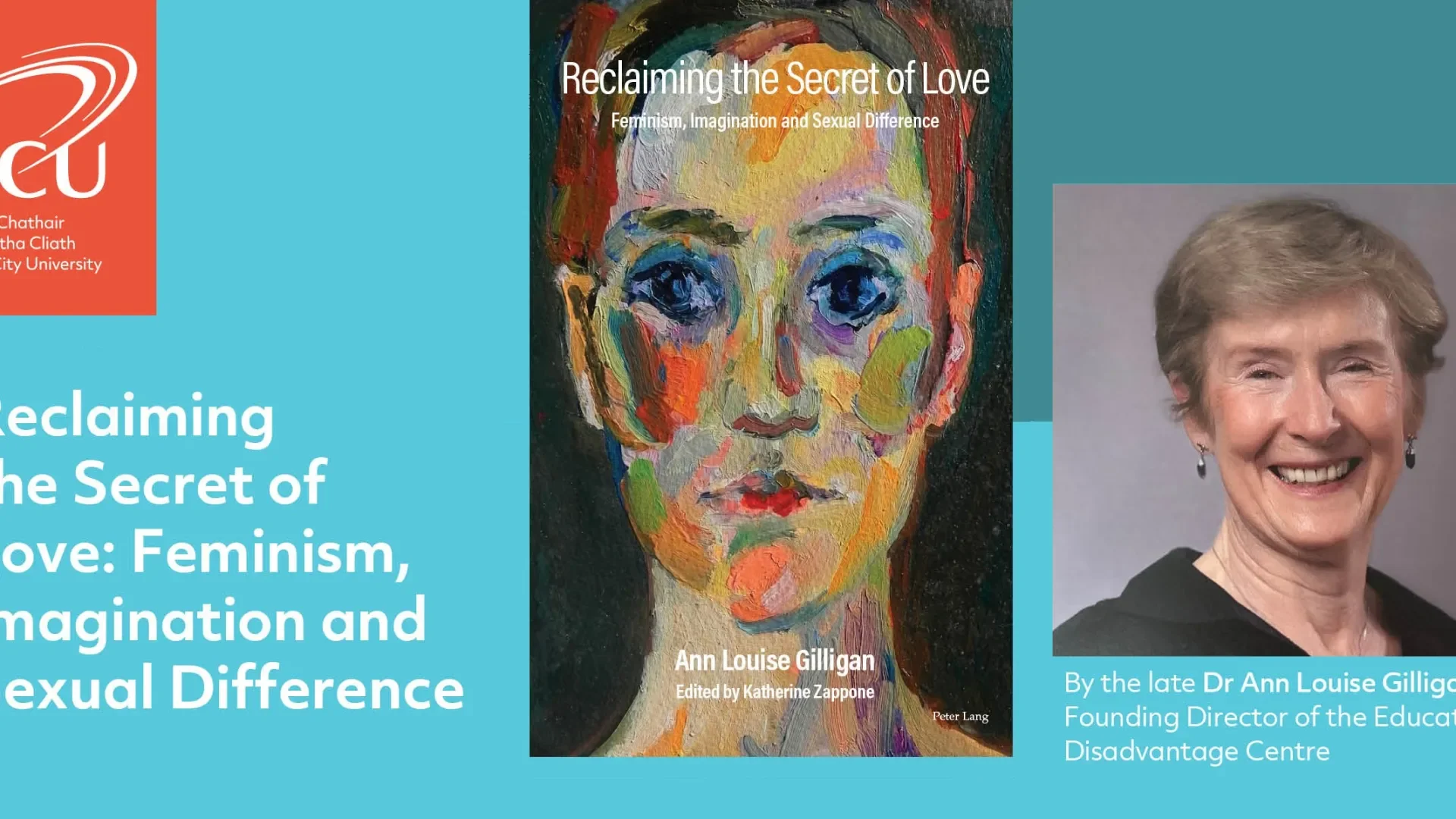
Dr Ann Louise Gilligan, Reclaiming the Secret of Love: Feminism, Imagination and Sexual Difference
THE LATE ANN LOUISE GILLIGAN’S BOOK LAUNCHED BY FORMER PRESIDENT OF IRELAND DR MARY MCALEESE
The Webinar can be viewed HERE
Dublin City University’s Educational Disadvantage Centre hosted a virtual event this evening (Tuesday 16 November) to launch ‘Reclaiming the Secret of Love: Feminism, Imagination and Sexual Difference’ by the late Ann Louise Gilligan, who established and directed the Centre.
The book builds from and extends Ann Louise's Ph.D thesis from Boston College setting out her vision for human subjectivity and education on which much of her teaching and life's work was based.
Welcoming keynote speaker Dr Mary McAleese and over 200 guests attending virtually from all over the world, Director of the Educational Disadvantage Centre in DCU’s Institute of Education, Dr Paul Downes said:
Ann Louise Gilligan was a visionary and her vision was very often associated with marriage equality and the injustice of poverty. But there’s a third vital pulse to this vision and it was her whole feminist vision. This book was to remain unpublished, but a number of us felt it merited publication so as to offer future generations the chance to engage with Ann Louises’s feminist thought - a positive one, celebrating imagination and love.
He continued:
Ann Louise lived a highly fulfilled life but this book can help her be 'reborn posthumously' for future generations... and allow all people to engage with her vision. She was a fearless advocate for change, she fought because she loved and not because she loved to fight and this book is an articulation of her vision of love.
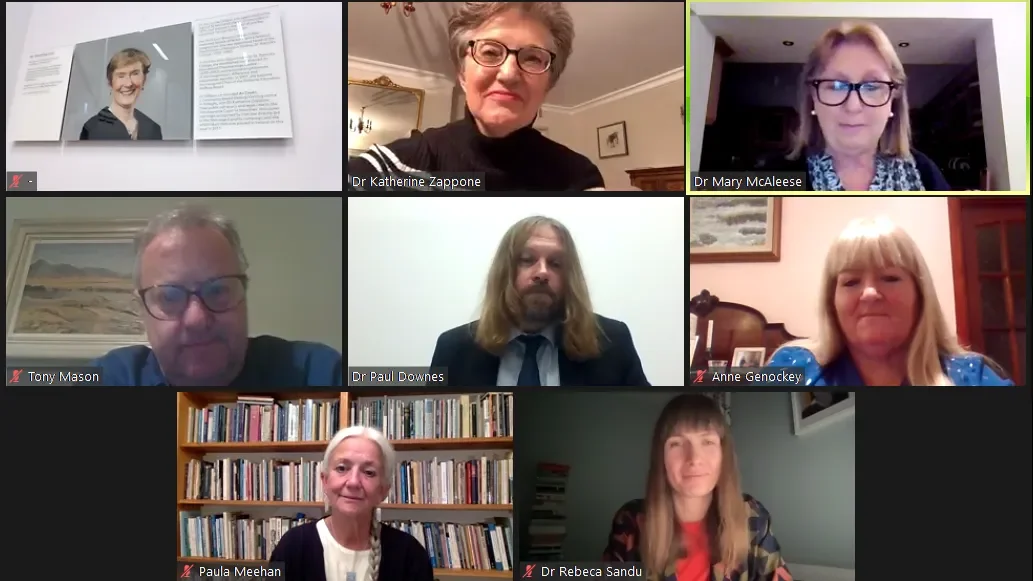
Panelists: Dr Katherine Zappone; Dr Mary McAleese; Tony Mason, Peter Lang Publishers; Dr Paul Downes; Anne Genockey; Paula Meehan; Dr Rebeca Sandu
Delivering the keynote, Dr. Mary McAleese, Professor of Children, Religion and Law at the University of Glasgow and 8th President of Ireland, said:
Thanks to Ann Louise Gilligan's book, we can see that times have changed. Many of us can track with a degree of humility our own awakening and views on a range of issues which we consciously debated, revised and changed our views. Ann Louise can take huge credit for the courageous way she helped us on that journey.
The book asks 'What's the most loving thing we can be doing, should be doing here and now?' It looks at the journey Ireland has undergone in relation to sexism and patriarchy - that journey is not just an Irish one, but an international one.
This book is replete with vibrant hope-filled determined imagery. She so confidently charts the road of imagination. It invites us to project this imagination, to be courageous and confident. It charts the journey we have to travel, the place we have to get to, the landscape of love, reclaiming the secret of love. That is Ann Louise's gift to us, said Dr McAleese
Ann Louise’s spouse and editor of the book, Dr. Katherine Zappone, spoke about the book’s beauty and power.
What Ann Louise is doing in this book is inviting the reader to take a journey, in particular a feminist journey in to the late 20th century. But it’s also an invitation to women and men to apply these insights to their own unfolding gender identities through their imaginations.
Guests also heard from Paula Meehan, renowned Dublin-born poet and playwright - and recipient of an honorary doctorate from DCU in 2019 - who paid tribute to Ann Louise by reciting her poem ‘Home’ which is quoted in the book.
Reclaiming the Secret of Love: Feminism, Imagination and Sexual Difference’ is published by Peter Lang and can be purchased here.
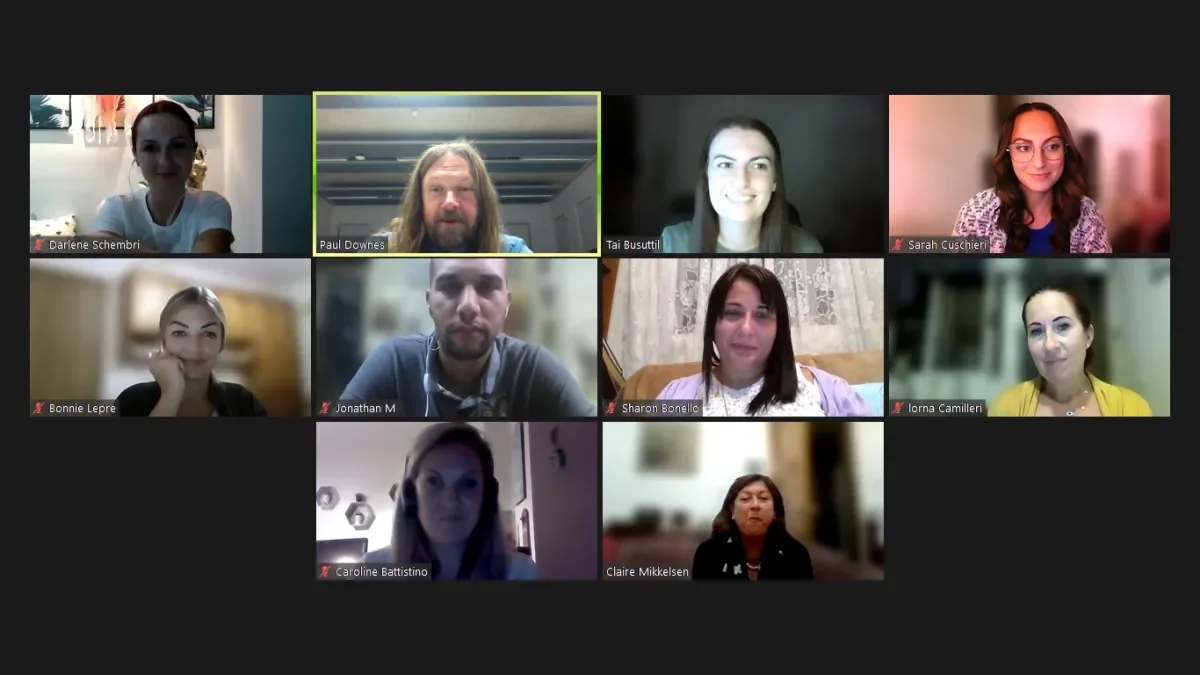
Maltese MEd students 2021
MALTESE EDUCATION MINISTRY FELLOWSHIPS AWARDED TO EDUCATIONAL DISADVANTAGE CENTRE, INSTITUTE OF EDUCATION
The Maltese Education Ministry has awarded 9 Masters Fellowships to the Educational Disadvantage Centre, DCU Institute of Education after an international competitive tender process. The Fellowship awardees are teaching in Maltese schools and will additionally engage in an advisory role to the Maltese Education Ministry in the area of early school leaving, together with Dr Paul Downes, Director of the Educational Disadvantage Centre. The 9 students have now commenced their online M Ed (Special Option, Poverty and Social Inclusion) in the Institute of Education.
Ms. Pamela Spiteri, The Maltese Ministry for Education said:
After a rigorous process, we are pleased to award these prestigious Maltese Education Ministry Fellowships to a leading group of nine educators who are embarking on a Masters in Education (Special Option, Poverty and Social Inclusion), in conjunction with the Educational Disadvantage Centre, Institute of Education, Dublin City University. This is a key part of our strategic commitment to the issue of early school leaving prevention in Malta, against the background of an EU Policy context prioritising this issue in education and through ESF funding.
Professor Anne Looney, Dean of the Institute of Education said:
The Institute of Education at Dublin City University is pleased to welcome the students awarded these prestigious fellowships to the Masters in Education programme with the Special Option in Poverty and Social Inclusion. The students from Malta will join a group of education leaders from Irish schools and educational settings who are focused on the transformative role of education in lives and communities. Supported by our Centre for Educational Disadvantage, this unique programme is increasingly recognised across Ireland and Europe for its innovative design and focus on practice and transformation. It also draws on the experience of the participants; we look forward to learning from and with our Maltese students in that context.
Dr Paul Downes, Director, Educational Disadvantage Centre, Associate Professor of Psychology of Education, DCU Institute of Education states:
Many congratulations to the Maltese Education Ministry Fellowship Awardees selected from a highly competitive field of applicants. These M Ed (Poverty and Social Inclusion, Special Option) Fellowships offer a real platform for this group to become national leaders in developing future national policy for early school leaving prevention in Malta. We warmly welcome these 9 Maltese Fellowship students as they join a learning community in our Educational Disadvantage Centre that also includes our 11 NEIC (North East Inner City) Fellowship M Ed (Poverty and Social Inclusion, Special Option) Awardees as future leaders and advocates in this area. Against the background of EU Council and Commission key ET2030 targets for reducing early school leaving and increasing completion of secondary school, it is hoped that we can learn from the teaching experiences, on the ground, of these new Maltese Ministry Fellowship recipients, to inform research to contribute to the longstanding and ongoing European Union prioritisation of this vital issue.
The successful Maltese Education Ministry Fellowship awardees are as follows:
Caroline Battistino, San Gorg Preca College, Marsa Primary School
Sharon Bonello, Paola Primary San Gorg Preca College
Tai Busuttil, Qawra Primary School, Maria Regina College, Triq il-Port Ruman, St. Paul’s Bay, Malta
Lorna Camilleri, Rabat Primary School, Gozo College, Victoria, Gozo
Sarah Cushieri, Floriana Primary School, San Ġorg Preca College, Floriana, Malta
Bonnie Lepre, St.Margaret's College, Xghajra Primary School
Jonathan Mifsud, STC Birkirkara Primary School, St Theresa College, Birkirkara, Malta
EliClaire Mikkelsen, Lily of the Valley, Mosta Secondary.
Darlene Schembri, St Margaret College Cospicua Middle School, Verdala
Educational Disadvantage Centre Book Launch, Reclaiming the Secret of Love: Feminism, Imagination and Sexual Difference (by the late Ann Louise Gilligan)
You are all very welcome to the online launch of our late colleague and friend, Dr Ann Louise Gilligan’s book, Reclaiming the Secret of Love: Feminism, Imagination and Sexual Difference (Peter Lang, 2021) on November 16th, 5pm. The book is based on Ann Louise's Ph. D thesis from Boston College, setting out her vision for education on which much of her teaching and life's work was based.
EUROPEAN ECONOMIC AND SOCIAL COMMITTEE OPINION ON BLENDED LEARNING AND INCLUSION
AFTERSCHOOL SUPPORTS IN LIGHT OF PANDEMIC RESPONSE: INTERVIEWS WITH DR PAUL DOWNES
Irish Times Tuesday November 2nd 2021
RTE's Drivetime, Tuesday November 2nd 2021
Inequality & erosion of rights to play in relation to private tutoring from our @dcu Educational Disadvantage Centre in the @IrishTimes today http://dcu.ie/edc #deis #childrensrights #uncrc
Primary school grinds: Parents turn to private tutors to counter learning loss @IrishTimes
NEW ARTICLE: O’Reilly Cullen, S. Fagan, B. & Downes, P. (2021). The emotional impact of parental imprisonment on children in primary schools: Developing an agenda for reform. INTO. Irish Teachers Journal Vol 9. (forthcoming, accepted for publication)
INVITED PRESENTATION SOCIAL JUSTICE IN EDUCATION, LONDON METROPOLITAN UNIVERSITY: DR PAUL DOWNES
Dr Paul Downes, Director, Educational Disadvantage Centre, Associate Professor of Psychology of Education, Institute of Education gave an invited presentation, Future Directions for Social Justice Research in Education: Europe and Internationally at the London Metropolitan University, Global Diversities and Inequalities Research Centre Webinar Event to launch the Book, Educational Research for Social Justice (A. Ross, Ed.) (Springer) October 13, 2021.
Other presentations given at the webinar were by Professor Mustafa Yunus Eryaman the current President of the World Education Research Association, Professor at Canakkale Onsekiz Mart University, Turkey and by Professor Jan Bamford, Professor of International Higher Education, co-director of the Higher Education Research Group and Professor Digby Warren, Head of the Centre for Professional & Educational Development and co-director of the Higher Education Research Group at London Metropolitan University.
Professor Alistair Ross, Editor of the book, Senior Professor in Politics and Education at London Metropolitan University gave the initial presentation.
Dr Downes’ presentation identified the elasticity of the concept of social justice and argued for it to be developed in three further innovative directions in future – with regard to a spatial turn for social justice research in education, a focus on the concrete other in systems of care and developing a human rights based focus integrating key insights from the UN Right to the Highest Attainable Standard of Health into education.
He argued that the book, Educational Research for Social Justice, offers an array of pervasive spatial concerns with a shift away from diametric spatial systems of exclusion towards concentric spaces of inclusion, building on his own recent book, Reconstructing agency in developmental and educational psychology: Inclusive Systems as Concentric Space (2020). Dr Downes identified implicit examples of diametric spatial system splitting and opposition as concerns in Professor Ross’ edited book. These include suspension and ‘offrolling’ in the interests of the school rather than the student, winner/loser meritocratic school cultures imposing narrow labels of failure/success, framing of students and families as ‘hard to reach’ as part of an us/them divide, a ‘false dichotomy’ opposing creativity versus basic literacy skills, young people categorising self and other with divisive identities based on assumed separation, as well as ‘cultural distance’ in Higher Education.
Dr Downes emphasised the need for reconceptualising social justice as systems of care based on assumed connection to the concrete other, building on the feminist work of Carol Gilligan and Seyla Benhabib, linking this also with a tradition of left realism in criminology led by Jock Young, to focus on lived realities of marginalised groups - regarding hunger, sleep, mental health strains, substance abuse, discrimination, bullying, suspension, gangs, fear of failure, authoritarian teaching. These issues are related to EU Commission concerns with early school leaving as a key ET2020 and ET2030 target, including a focus on systems of care for complexity involving multidisciplinary teams in and around schools, bridging health and education.
The third strand of Dr Downes’ presentation highlighted the neglect of a poverty focus in the UN Children’s Rights Convention and the opportunities for social justice research to develop legal rights based arguments through the framework of the UN Right to the highest attainable standard of health, developed for education. This framework offers an explicit engagement with poverty, vulnerable groups, minorities and local community participation. Interdisciplinary bridges for social justice in education are argued to need to bring together psychology, law, geography, criminology and health promotion with sociology, politics, economics, philosophy to find common discourses for policy and practice relevant debate. The IRNEYET (International Research Network on Equity in Youth Education and Training) co-founded and led by Dr Downes and DCU Educational Disadvantage Centre seeks to build such bridges.
PRIMARY PUPILS ‘NEED EMOTIONAL COUNSELLORS’ TO HELP THEM DEAL WITH THE TOLL OF THE PANDEMIC
PAUL DOWNES SPEAKING AT LAUNCH OF BOOK, ‘EDUCATIONAL RESEARCH FOR SOCIAL JUSTICE: EVIDENCE AND PRACTICE’
Written by a team that was predominantly based at London Metropolitan University, the chapters present a series of analyses of educational policies – largely in the UK, but some also in Europe – researched by a team of social scientists who share a commitment to social justice and equity in education. We explore what social justice means, in educational policy and practice, and how it impacts on our understanding of both ‘educational science’ and ‘the public good’. Using a social constructivist approach, we argue that social justice requires a particular and critical analysis of the meaning of meritocracy, and of the way this term turns educational policies towards treating learning as a competition, in which many young people are constructed as ‘losers’.
This volume:
· Uses intersectionality as a running theme between chapters and topics
· Draws from a range of educational policy settings, from early years to higher education, in the UK and continental Europe
· Argues that a good society is one in which social rewards are broadly distributed between all social groups.
We consider the responsibilities of educational researchers to acknowledge these issues, and offer examples of researching with such a commitment. We conclude by considering how educational policy might contribute to a socially just, equitable and inclusive public good.
This is the first volume in the World Educational Research Association’s series: Education Science, Evidence, and the Public Good, edited by Professor Alistair Ross and published by Springer Nature, Switzerland
Book launch 13th October 2021 @ 17.00 IST. Register here ALL WELCOME
Speakers:
Professor Alistair Ross (editor of the book) is Senior Professor in Politics and Education at London Metropolitan University (part-time). He has a PhD in Politics from the University of London, a DLitt from London Metropolitan, and is a Fellow of the Academy of Social Sciences.
Professor Mustafa Yunus Eryaman (series editor of 'Education Science, Evidence, and the Public Good' ) is the current President of the World Education Research Association, and a Professor at Canakkale Onsekiz Mart University, Turkey. He has worked as a DAAD-TUBITAK Professor at the Institute for International Comparative and Intercultural Education in the University of Hamburg for two years. He was an Honorary Research Fellow at the Institute for Policy Studies in Education at London Metropolitan University in 2011. He currently serves as the series editor of the Springer Book series 'Education Science, Evidence, and the Public Good', the first volume of which will be launched during the event, and is the regional editor of the Bloomsbury Education and Childhood Studies (Bloomsbury Publishing).
Dr. Paul Downes is Associate Professor of Psychology of Education in the Institute of Education, Dublin City University, and Director of the Educational Disadvantage Centre at Dublin City University, Ireland. He is a member of various expert advisory groups with the European Commission, and has an inclusion and citizenship brief for the European Education and Training Expert Panel that supports the EU’s post-2020 Strategic Cooperation Framework for Education and Training. Recent books include 'Concentric Space as a Life Principle Beyond Schopenhauer' (2019) and 'Reconstructing agency in developmental and educational psychology' (2020; both Routledge). He is an Affiliate Professor at the University of Malta, with visiting Research Fellowships at the University of British Columbia and the University of Cambridge.
Professor Jan Bamford is a Professor of International Higher Education, co-director of the Higher Education Research Group, and Head of Student Experience and Academic Outcomes in the University’s Guildhall School of Business and Law. She co-authored 'Cultural Journeys in Higher Education: Student Voices and Narratives' (Emerald, 2019) and authored 'Joint Degrees and International Transitions in Higher Education: The Self, Pedagogy and Culture' (Palgrave MacMillan, 2020). Her book on improving student experience and the role of third space professionals will be published by Routledge in 2022. Jan is a founding member of the Advance HE Connect International Interdisciplinary Research in Assessment Practice (INRAP).
Professor Digby Warren is Head of the Centre for Professional & Educational Development and co-director of the Higher Education Research Group at London Metropolitan University. He has practice-based and research-informed expertise in teaching, learning and curriculum development and staff professional development, focusing on education for social justice and transformational approaches to teaching in the context of student diversity. Lead role in EU-funded international projects (2011-2018) to modernise HE, using curriculum and teaching development as a driver for innovation. Co-editor and co-author of 'Enhancing Teaching Practice in Higher Education' (2nd edition) (Sage, 2021).
Chair:
Professor Louise Ryan, Director of the Global Diversities and Inequalities Research Centre
The Global Diversities and Inequalities Research Centre is a home for interdisciplinary and multidisciplinary scholarship that explores migration, diasporas, nations, regions and localities through the lenses of diversity and inequality.
Please contact the Research and Postgraduate Office if you have any questions about this or any of our other events - rpo@londonmet.ac.uk.
To receive notifications of future events, please follow the Research and Postgraduate Office on Eventbrite.
NO DETENTIONS OR SUSPENSIONS: THE SCHOOLS REJECTING SUPER-STRICT VALUES
Irish Times, Tuesday September 21st 2021
Restorative practice in classrooms seeks to address problems through a supportive rather than punitive approach.
“The boys in my class got into a lot of trouble today,” my nine-year-old daughter’s neighbourhood friend confides, jumping up and down on the kerb, brandishing a lop-sided ice-cream. “They had to stand up against the wall at lunchtime.” Her eyes widen, relishing the playground drama, writes Jennifer Horgan. READ MORE HERE and ACCESS PDF HERE
A NEW POST-PANDEMIC SOCIAL CONTRACT BETWEEN HEALTH AND EDUCATION: KEYNOTE PRESENTATION
Dr Paul Downes, Associate Professor of Psychology of Education and Director, Educational Disadvantage Centre, Institute of Education, gave the keynote presentation A New Post-Pandemic Social Contract between Health and Education in Ireland: Key Issues for DEIS Schools and Wider Contexts for the National Webinar of the Children’s Futures Network (September 21, 2021). The Children’s Futures Network is composed of AsIAm, Barnardos, Children’s Rights Alliance, Inclusion Ireland, National Parents Council Primary, Pavee Point, Children’s Books Ireland, Dyslexia Association of Ireland, Foróige, SpunOut.ie, Society of St. Vincent de Paul, UNICEF Ireland and Museum of Childhood Ireland.
Dr Downes’ presentation focused on a range of key issues bridging health and education to meet marginalised students’ holistic educational needs, to address system gaps exacerbated in light of the Covid pandemic. These issues requiring a reshaping of boundaries between health and education in Ireland include the need for:
a) Emotional Counsellors/Therapists in and around Schools for trauma and adverse childhood experiences,
b) Addressing Child Poverty including through Hot Meals for Children in Schools and Families through Area Based Childhood (ABC) Projects
c) A National Arts and Social Inclusion in Education Strategy addressing social isolation from pandemic lockdowns
d) Alternatives to Suspension/Expulsion/Reduced Timetables including through provision of Emotional Counselling/Therapeutic Supports and Multidisciplinary Teams
and e) Sleep Awareness curricular approaches in schools.
Dr Downes highlighted that successive recent Joint Oireachtas Education Committee reports on Covid response (January 2021) and on mental health and school bullying (August 2021) have given the same key recommendation, namely, that emotional counselling and therapeutic supports be provided in all primary and secondary schools as an ‘urgent priority’. The Covid Response Oireachtas Report also recommends, ‘The provision of hot meals to vulnerable students should be expanded to cover periods of school closures and holidays and a Hot Meals Programme should be rolled out nationally to all schools on a phased basis’.
His presentation documented that the Ombudsman for Children, Dr Niall Muldoon, was asked by the Chair of the Oireachtas Committee to develop a concrete proposal for such specialist emotional counselling/ therapeutic in schools, while emphasising a key recommendation in the Child Ombudsman’s proposal is a pilot across the whole country to cover both Primary and Post Primary to establish 160 emotional counsellors nationally, in every county, at a cost of just under €10milllion per annum.
Article 31 of the UN Convention on the Rights of the Child was discussed by Dr Downes as a key basis for the issues of both sleep awareness and a national arts and social inclusion in education strategy, given that this Article specifically refers to the right of the child to rest and to participate fully in cultural and artistic life with equal opportunities for cultural, artistic, recreational and leisure activity. These were argued to provide a key legal basis for developing these social inclusion issues in the forthcoming new National Children’s Strategy
An extract from Dr. Downes’ keynote presentation was featured as an opinion piece in the Irish Examiner (Sept 24th), as well as in the Irish Times (Sept 21st), and the Irish Examiner (Sept 22nd)
His invited article with the same title as the keynote presentation has just been published in the IPPN (Irish Primary Principal’s Network) Leadership+ Issue 119, October 2021 page 9
Covid-Proofing the Education System is in Best Interests of Children
Posted on Tuesday September 21, 2021
FOUNDATION P&V BRUSSELS, LAUREAT AWARD FOR PAUL DOWNES
Dr Paul Downes, Director of the Educational Disadvantage Centre, Associate Professor of Psychology of Education, Institute of Education, DCU received a Foundation P&V Brussels, Laureat Award for his Article on Connecting You(th): Overcoming Divisions in Society (2021), Local Community Lifelong Learning Centres and Supports as Spatial Relational Systems: Changing Diametric Spaces of Exclusion towards Concentric Spaces of Inclusion for a Spatial-Ecological Systems Science.
The article was evaluated during a first round by three experts per article. The second round of evaluation was undertaken by a high-level evaluation committee presided by Professor Olivier Servais, UCLouvain.
CONGRATULATIONS TO DR JO-HANNA IVERS
Many congratulations to Dr Jo-Hanna Ivers, Research Associate and Masters Graduate with our Centre, on her recent appointment as Associate Dean of Civic Engagement and Social Innovation at Trinity College Dublin.
Jo-Hanna's Masters’ Thesis was published in the European Journal of Psychology of Education in 2012: Ivers, J. & Downes, P. (2012). A phenomenological reinterpretation of Horner's fear of success in terms of social class. European Journal of Psychology of Education 27 (3), 369-388.
UKRAINIAN AND AUSTRIAN MINISTRY CONFERENCE INVITED PRESENTATION ON INCLUSION
Dr Paul Downes, Director, Educational Disadvantage Centre, Associate Professor of Psychology of Education in the IoE School of Human Development gave an invited presentation at the Ukrainian Ministry of Education and Science International Conference, in partnership with the Federal Ministry of Labour and the Federal Ministry of Education, Science and Research of the Republic of Austria, “A Resilient Danube Region through Digitalization, Inclusion and Education”, June 17-18, 2021.
The Conference was opened by Ms Olga Revuk, Deputy Minister of Social Policy, Ukraine, with introductory presentations from Daria Bovkun, Ministry of Education and Science, Ukraine, Roland Hanak, Federal Ministry of Labour, Austria, Jürgen Schick, Federal Ministry of Education, Science and Research, Austria and Anna Gherganova, Ministry of Health, Labour, and Social Protection, Republic of Moldova.
Dr Downes’ presentation, Six Steps to Promote Inclusive Systems for Early School Leaving Prevention: The Emotional-Relational Turn Bridging Health and Education, built on five of his monographs published by the EU Commission on the themes of early school leaving, multidisciplinary teams, school bullying and violence, social and emotional education, and inclusive systems.
His presentation emphasised the need to address trauma and complex mental health needs, to treat school bullying as an early school leaving issue, and for government strategies on inclusive systems to recognise the public health model of differentiated need based on children and young people’s different levels of risk, as part of common strategic bridges between health and education. His presentation also focused on an emotional-relational turn for early school leaving prevention that accelerates a whole school focus on social and emotional education, including positive school and classroom climate beyond authoritarian teaching.
Dr Downes' presentation can be accessed HERE
DR PAUL DOWNES HIGHLIGHTS LONG-TERM DAMAGING EFFECTS OF SCHOOL BULLYING ON MENTAL HEALTH AT A JOINT OIREACHTAS (PARLIAMENT AND SENATE) EDUCATION COMMITTEE
Dr. Paul Downes, Associate Professor of Psychology in DCU’s Institute of Education has highlighted the serious, sustained, long-term damaging effects of school bullying on mental health, physical health and school engagement.
Speaking at the Joint Oireachtas Committee on Education at its meeting on School Bullying and the Impact on Mental Health, he emphasised that school bullying is an issue of trauma accelerating risk of anxiety, depression and self-harm and that it is an adverse childhood experience.
He called for specialist emotional counselling and therapeutic supports in schools as a serious sustained response, supports currently lacking at both primary and secondary school levels in Ireland.
Dr. Downes extracted key psychological issues for victims of bullying according to international research, such as cycles of self-blame and self-hate as a double victimising, hopelessness, fatalism and avoidance behaviours of resignation and social withdrawal, all requiring specialised emotional counselling/therapeutic supports in schools, while also raising the need of such supports for early intervention with bullying perpetrators.
His presentation built on other key themes in the EU Commission report*. These include the need for parenting programmes and increased focus on family support services as part of school bullying prevention, and for an acceleration of emphasis on social and emotional education, against the backdrop of the new EU Key Competence for Lifelong Learning, the Personal, Social and Learning to Learn Key Competence.
While recognising the key role of students’ voices, Dr. Downes raised legal and psychological concerns about peer defender/challenger approaches to the bullying perpetrator. He argued that as it is reasonably foreseeable that a bullying perpetrator may also victimise the peer defender, schools thereby risk negligence claims for breaching their duty of care to individual students through encouraging them into peer defender roles.
Invited presentations and submissions were also given to the Oireachtas Committee by Professor Shelley Hymel, Edith Lando Professor in Social and Emotional Learning, University of British Columbia, Vancouver and Professor Carmel Cefai, Department of Psychology and Director, Centre for Resilience and Socio-Emotional Health, University of Malta.
*Dr. Downes’ and Professor Cefai’s submissions were based on their monographs published by the European Commission: Downes, P. & Cefai, C. (2016). How to tackle bullying and prevent school violence in Europe: Evidence and practices for strategies for inclusive and safe schools. Luxembourg: Publications Office of the European Union/EU bookshop; Cefai, C., Bartolo P. A., Cavioni. V., Downes, P. (2018). Strengthening Social and Emotional Education as a core curricular area across the EU: A review of the international evidence. Luxembourg: Publications Office of the European Union/EU bookshop. READ MORE
Dr. Downes’ opening statement and full invited submission to the Committee is published here
IMPACT OF COVID ON SCHOOLS IN COMMUNITIES EXPERIENCING POVERTY AND SOCIO-ECONOMIC EXCLUSION
Evelyn O'Rourke spoke to Niamh Murray, Principal of Rutland Street Junior School, students from the school, and Dr Paul Downes, Educational Disadvantage Centre, on the impact of Covid on schools in disadvantaged communities. This interview was broadcast on RTE's Today with Claire Byrne on Wednesday May 18th 2021. LISTEN HERE
The Wider View on News Northern Sound, 19th July 2021. LISTEN BACK: Calls for emotional counselling to be introduced in schools.
Larissa Nolan on radio: We are not all in this together as Covid and cuckoo funds demonstrate
EDUCATION MATTERS PANEL DISCUSSION
A panel discussion with Dr Paul Downes, Associate Professor at the Institute of Education, DCU; Simon Lewis, Principal Carlow Educate Together NS; Dr Brian Mooney, Editor Ireland’s Education Yearbook; Niamh Murray, Principal Rutland Street NS and Sally O' Herlihy, Chairperson of her school’s Parents Association. May 4th 2021. VIEW HERE
EMOTIONAL COUNSELLING SUPPORTS SHOULD BE MANDATORY IN ALL PRIMARY AND SECONDARY SCHOOLS IN IRELAND, AN EXPERT SAYS.
Newstalk May 3rd 2021
Dr Paul Downes, Associate Professor of Psychology of Education at Dublin City University, told Newstalk Breakfast these supports are needed in schools - but they're just not there at the moment. LISTEN HERE
CALLS FOR SCHOOLS TO HAVE MANDATORY EMOTIONAL COUNSELLING SUPPORTS
98 FM May 3rd 2021
DCU Associate Professor in Psychology of Education, Dr Paul Downes, has said it can help with complications such as parental issues, bullying and mental health. READ MORE
DUBLIN PROFESSOR PUSHING TO MAKE EMOTIONAL COUNSELLING SUPPORTS A LEGAL REQUIREMENT IN ALL IRISH SCHOOLS
Dublin Live News May 3rd 2021
A university professor in Dublin, Dr Paul Downes, has warned that emotional counselling supports are vitally needed in both primary and secondary schools in Ireland.
The Associate Professor of Psychology of Education at Dublin City University believes that the supports should be mandatory in all schools as they are not in place at the moment. READ MORE
PUSH TO MAKE EMOTIONAL COUNSELLING A LEGAL RIGHT IN SCHOOLS
Spin 103.8 May 3rd 2021
DCU Associate Professor in Psychology of Education, Dr Paul Downes, has said it can help with complications such as parental issues, bullying and mental health. According to Dr Downes, emotional counselling is available in colleges, but that "emotions with younger people" doesn't start at 18. READ MORE
CONGRATULATIONS TO OUR CENTRE'S NEIC FELLOWSHIP MASTERS STUDENT SEÁNA BRADY ON HER RECENT ELECTION AS NATIONAL EQUALITY OFFICER WITH ÓGRA FIANNA FAIL
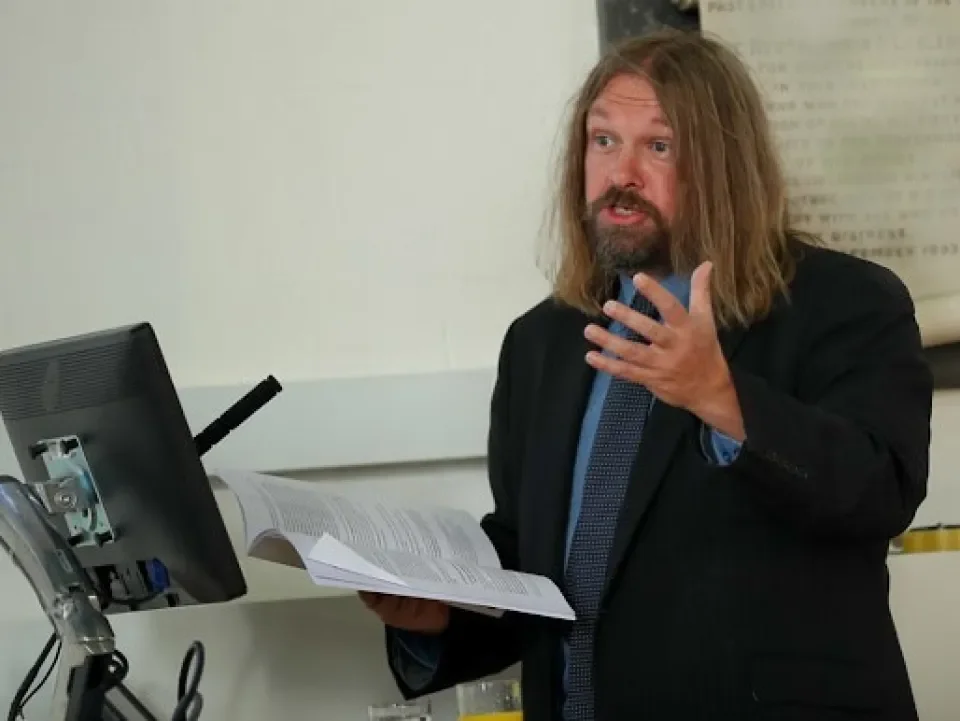
Dr Paul Downes
EU COMMISSION KEYNOTE PRESENTATION ON WELLBEING, MENTAL HEALTH AND AGENCY
Dr Paul Downes Director of the Educational Disadvantage Centre and Associate Professor of Psychology of Education in DCU Institute of Education gave the Keynote Presentation, A Holistic Differentiated Response for Wellbeing and Mental Health, Resilience and Agency across Europe: Addressing Covid Pandemic Lockdown Impact on Education at a European Commission Meeting, on April 23rd 2021.
The webinar meeting was attended by researchers from all EU countries across Europe, as well as EU Commission officials from the Directorate General, Education and Culture and DG Employment. The meeting is to inform the Commission’s research and policy responses to themes of wellbeing and resilience gaining further emphasis in light of the Covid 19 pandemic.
Dr Downes argues that there is a need to move beyond slogans of individual resilience and a common experience of lockdown impact, highlighting international research on the interplay between family conflict in lockdown, poverty, loneliness, anxiety and depression, with a focus also on the issue of sleep loss and stress. A strategic response to mental health and wellbeing in Europe is called for that differentiates levels of complexity of need. This is as part of a renewed emphasis on the need for Education, Health and Social Services Ministries in Member States across Europe to develop integrated cross-department strategic and funding approaches to supporting vulnerable groups in education.
Emphasising concrete supports for trauma and adverse childhood experiences in and around schools, as well as an acceleration of curricular emphasis on social and emotional education across Europe, building on the new EU Key Competence for Lifelong Learning, the Personal, Social and Learning to Learn Key Competence, Dr. Downes identifies a range of priority themes as part of an agenda for a Covid pandemic related holistic differentiated response for wellbeing and mental health, resilience and agency across Europe. These recommended key policy and research themes also include afterschool funds for the Arts, sports, nature and outdoor education for meaningful activities to promote children and young people’s agency and to address loneliness and social needs.
Given that the pandemic has involved reconstructing basic assumptions of space, the opportunity for reconfiguration of physical and relational spaces in schools is emphasised. This also involves co-location of key health services onsite in schools.
EDUCATION MATTERS VIRTUAL SUMMIT
Dr Paul Downes and Niamh Murray, Principal Rutland St NS, are interviewed under the primary education part of this national virtual Education Summit: https://summit.educationmatters.ie/ that is taking place next week. Their discussion takes place on May 4th.
DUBLIN CITY UNIVERSITY HAS BEEN RANKED 23RD IN THE WORLD FOR ITS APPROACH TO WIDENING PARTICIPATION IN HIGHER EDUCATION AND ITS ONGOING COMMITMENT TO ERADICATING POVERTY.
The University was also ranked 38th globally for its work in reducing inequality and 89th globally for gender equality, reflecting its commitment to achieving equality, diversity and inclusion for staff and students.
These results are part of the Times Higher Education Impact Rankings 2021 released today, which capture universities’ impact on society and are based on institutions’ success in delivering the United Nations’ Sustainable Development Goals (UN SDGs).
The Rankings examined research, outreach, stewardship and teaching in a total of 1115 institutions worldwide.
- 23rd Globally for SDG 1 - No Poverty: DCU was recognised for its well-established and comprehensive approach to widening participation in higher education, including the Access to the Workplace initiative, which supports students from economically disadvantaged backgrounds to secure summer work-placements, supported by the DCU Educational Trust. It also recognised DCU’s work as Ireland’s first designated University of Sanctuary and its commitment to welcoming people seeking asylum and refugees into the university community. This ranking also acknowledges DCU's long standing commitment to eradicating poverty through external community engagement, e.g. the Educational Disadvantage Centre in the DCU Institute of Education. READ MORE
MINISTER HUMPHREYS LAUNCHES HOT SCHOOL MEALS PROGRAMME 2021: RECORD 35,000 STUDENTS TO BENEFIT
Department of Social Protection. March 25th 2021. Read Press Release here
CONGRATULATIONS TO IRISH PRISON SERVICE PH.D FELLOWSHIP RECIPIENT BRONAGH FAGAN
Bronagh also has experience in alternative education settings for young people who have experienced varying degrees of social adversity and have become alienated from mainstream school. She currently works in a high support special school, teaching young people with emotional and behavioural difficulties who are in need of care and protection and require the provision and delivery of an education service in a secure and therapeutic environment.
She also has a keen interest in working with prisoners and their families towards initiatives to strengthen positive family ties and to enable parents in prison to play a role in their children’s educational and holistic development. In 2016, she completed a Masters in Criminology in Technological University Dublin and was awarded the Association for Criminal Justice Research and Development prize for outstanding academic performance in a youth justice related dissertation. Her research investigated the role of alternative education provision in supporting pathways out of crime for young people. In Irish prisons, Bronagh has facilitated parenting courses with incarcerated fathers and facilitates ongoing workshops in conflict resolution and restorative practices for the Alternatives to Violence Project. She has also volunteered in prisons in Africa and South-East Asia.
EDC NEIC FELLOWSHIP STUDENT SEÁNA BRADY

Seána Brady
Teachers are not therapists - Ógra Fianna Fáil.
Anglo Celt, Tuesday March 23rd 2021
Seána Brady, NEIC Fellow, will be among the group scheduled to meet Minister Foley to demand better supports for vulnerable young people.
BACK TO SCHOOL: ‘YOU HOPE THEY WILL BE ABLE TO CATCH UP’. IRISH TIMES INTERVIEW WITH PAUL DOWNES
Irish Times Saturday February 27th 2021
After a year of disruption, there are concerns over long-term impact of school closures,writes Carl O’Brien. READ MORE
EDUCATIONAL DISADVANTAGE CENTRE MEMBERSHIP OF UN FRESH COORDINATING COMMITTEE
The FRESH Partnership is a coalition or network comprised of representatives of a number of UN agencies, donor organizations and global non-governmental/ civil society organizations concerned with promoting inclusive education, health, safety, equity and various types of social, sustainable and human development through, with and within schools and education systems.
The Educational Disadvantage Centre (EDC) is one of the global organizations and agencies to have designated representatives to the FRESH Coordinating Committee as of December 2020: https://www.fresh-partners.org/members-work-groups-corresponding-organizations.html
The EDC has been contributing on themes of social inclusion in education, and social and emotional education, with a strong focus on bridging health and education multidisciplinary team supports in and around schools.
EPIC - EMPOWERING PEOPLE IN CARE - KEYNOTE PRESENTATION WEBINAR FEBRUARY 16th 2021
Dr Paul Downes, Director of the Educational Disadvantage Centre, DCU Institute of Education gave the keynote Presentation at the EPIC - Empowering People in Care – Webinar on February 16th 2021. The presentation is entitled The Holistic Educational Needs of Children and Young People in Care: Placing an Invisible Issue onto the National Policy Agenda.
The presentation builds on the work of the National Children in the Care of the State and Education System Working Group established by the Educational Disadvantage Centre in 2018. This group includes representatives from the INTO, IMPACT, Children's Rights Alliance, National Parent's Council Primary and Early Years, Empowering People in Care (EPIC), Focus Ireland, Irish Foster Care Association (IFCA), Careleavers Network, DCU Institute of Education, Maynooth University, as well as DCU and Maynooth Access Service.
The keynote presentation and subsequent discussions examined many themes in the Letter to the Irish Times on this issue, developed by members of this Working Group in September 2020 as part of the group's deliberations: https://www.irishtimes.com/opinion/letters/educational-needs-of-children-in-care-1.4360745
EPIC Webinar Podcast available to view here
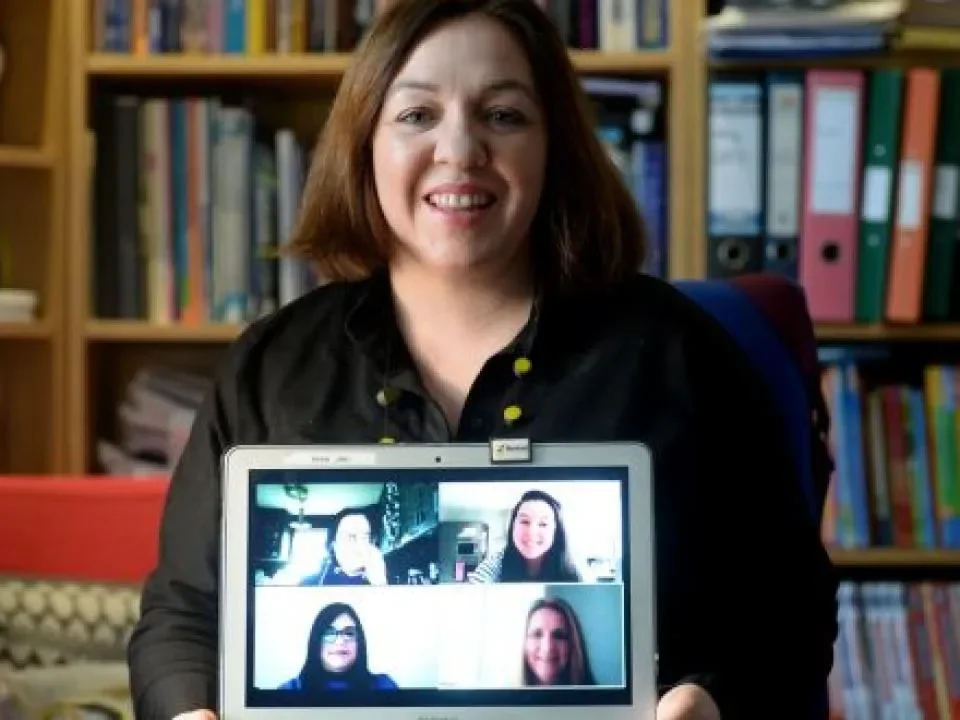
Jennifer Cummins, coordinator of the Ballymun Anseo School Completion Programme, with fellow staff members Lorraine Uzell, Jackie Hogg, Katie Walsh and Romi Garci, onscreen. Photograph: Alan Betson
SIGN ON, ZOOM IN, DROP OUT: COVID-19 SPARKS FEARS OVER EARLY SCHOOL LEAVING
Irish Times Tuesday February 16th 2021
While remote learning increases dropout risks for disadvantaged students, targeted supports are aiming to prevent it. Jennifer Cummins’ job is to help prevent pupils from dropping out of school. At a time of huge disruption to the school year and a shift to online learning, her task is more daunting than ever writes Michelle McBride. READ MORE
NEW EU COMMISSION MONOGRAPH PROVIDES A FRAMEWORK FOR HOW SOCIAL AND EMOTIONAL EDUCATION CAN BE ASSESSED THROUGH A WHOLE-SCHOOL APPROACH
Dr Paul Downes, Associate Professor of Education (Psychology) in DCU’s Institute of Education, has co-authored a monograph which provides an innovative framework for how social and emotional education (SEE) may be assessed through a whole-school approach, and how this may be carried out in schools.
The monograph, A formative, inclusive, whole school approach to the assessment of social and emotional education in the EU, which has been published by the European Commission, also identifies a number of areas that need to be addressed to advance the effective implementation of formative assessment of social and emotional education in the EU.
While social and emotional education is fast developing as a core area of the curriculum in Europe, its assessment across the EU still appears fairly fragmented. This monograph serves as a platform for the development of a collaborative, systemic and inclusive European identity for social and emotional education assessment, in contrast with other individualistic, personality- and character-based, normative modes.
It seeks to bring greater integration and consistency to assessment practices for this key competence at regional, national and European levels, against the backdrop of the new EU Key Competence for Lifelong Learning, Personal, Social and Learning to Learn.
This monograph builds on two previous ones published by the EU Commission on inclusive systems and social and emotional education also led and co-authored by Dr Downes, which were key sources cited in the EU Commission’s Staff Working Paper and Recommendation to the EU Council of Ministers in 2018 for developing the new European Key Competence for Lifelong Learning across the EU, namely, the Personal, Social and Learning to Learn Competence.
Dr Downes was also a member of the EU Commission’s Expert Advisory Group for the new EU framework published to develop this Personal and Social Key Competence https://ec.europa.eu/jrc/en/lifecomp and invited co-author for a 2021 Science for Policy briefing paper, Developing social and emotional skills through non-formal learning published by the Joint Research Centre of the European Commission
EU COMMISSION'S CEDEFOP WEBINAR, MAKING EXCELLENCE INCLUSIVE, FEBRUARY 3RD 2021
The Personal, Social and Learning to Learn Key Competence was also a central theme of Dr Downes’ opening keynote presentation, A systemic focus in VET (Vocational Education and Training) on emotions and agency for inclusion at the EU Commission’s Cedefop Webinar, Making Excellence Inclusive, on February 3rd 2021.
Introductory speeches at the Webinar were given by Chiara Riondino – Head of Unit E3 Directorate General, Employment, European Commission and Michael Teutsch – Head of Unit Schools and Multilingualism, Directorate General, Education and Culture, European Commission
Making Excellence Inclusive: Towards a new Cedefop survey of VET teachers and trainers. Online webinar February 3rd 2021 Summary of outcomes
JOINT OIREACHTAS COMMITTEE ON EDUCATION REPORT ON THE IMPACT OF COVID-19 MAKES A NUMBER OF KEY RECOMMENDATIONS BASED ON DCU SUBMISSIONS
The Joint Oireachtas Committee on Education, Further and Higher Education, Research, Innovation and Science Report on The Impact of COVID-19 on Primary and Secondary Education January 2021 has just been published.
Of the Report’s 10 key recommendations based on the numerous sessions of the Committee, three of these are explicitly based on the presentations and submissions made by DCU Institute of Education’s Educational Disadvantage Centre and National Anti-Bullying Research and Resource Centre.
These three key recommendations in the report are as follows:
- “The Department of Education should update the 2013 Anti-Bullying Procedures for Primary and Secondary Schools to include guidelines for addressing homophobia and transphobia.”
- “The provision of hot meals to vulnerable students should be expanded to cover periods of school closures and holidays and a Hot Meals Programme should be rolled out nationally to all schools on a phased basis.”
- “Emotional counselling and therapeutic supports should be provided in all primary and secondary schools as an urgent priority.”
Paul Kehoe T.D., Chairman, Joint Committee on Education, Further and Higher Education, Research, Innovation and Science stated in the Foreword to the Report, “I would like to express gratitude to DCU for their tremendous support and service to the Committee.”
A range of other recommendations and issues raised in both Centre’s presentations and submissions are additionally addressed and supported by the Joint Oireachtas Committee on Education, Further and Higher Education, Research, Innovation and Science in their Report.
The full submissions and opening statements of the National Anti-Bullying Research and Resource Centre and Educational Disadvantage Centre are available here:
2020 News
Published in Education Matters, Ireland’s Education Yearbook 2020
EXPERT GROUP CALLS FOR INCREASED SUPPORTS FOR MARGINALISED SCHOOL CHILDREN, INCLUDING EMOTIONAL COUNSELLING, HOT LUNCHES AND AFTER SCHOOL SERVICES
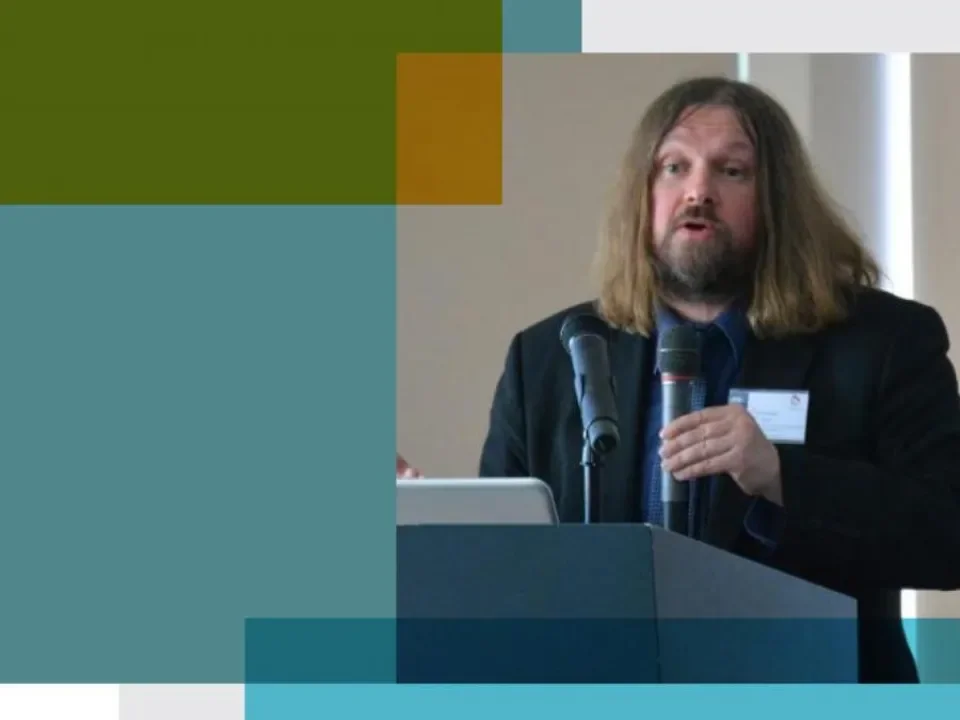
Associate Professor Paul Downes
Speaking at an Oireachtas Joint Committee on Education on Thursday December 17th 2020, Dr Paul Downes, Director of the DCU Educational Disadvantage Centre, addressed the priority issues and policy gaps facing marginalised students in primary and post primary DEIS schools and other settings.
Dr Downes stressed the need for emotional counselling and therapeutic supports in and around schools to address trauma, anxiety, mental health difficulties of vulnerable children. He also raised important issues such as the provision of hot school lunches and the need to look at an alternative to suspension and expulsion in schools.
“Trauma and adversity impacting on mental health of our children and young people are exacerbated in this COVID-19 pandemic, including the additional emotional and financial strain of lockdown on so many families.
This requires a heightened awareness of policy makers about a key strategic gap in supports in Irish schools that places Ireland radically out of step with many European countries regarding emotional counsellors and therapists in and around every school,” says Dr Paul Downes.
The expert group recommends that emotional counselling and therapeutic supports, such as play and art therapy, be available in all DEIS schools and arguably beyond, as a key support for the mental health strain and trauma experienced by so many children.
Speaking about her experience in the classroom, Sinead Crossan, a teacher in Central Model Senior DEIS School, Dublin 1 said
“Ideally I would recommend art and/ or play therapy for 1/4 of my class. However, this year the service is so limited due to COVID-19, that no students in my class have been prioritised. This is a real concern regarding this cohort of 6th class children as they transition to secondary school next year. This lack of availability of emotional counselling support leaves these children extremely vulnerable and potentially without the necessary skills, as they progress in their educational journey."
A concern of mine surrounds children in temporary and/ or emergency accommodation. Many of these accommodations offer very limited access to cooking facilities and for these children, a hot school lunch could be their only hot meal of the day,” says Ms. Crossan.
The importance of providing adequate hot meals in schools was also raised, with the recommendation that hot lunches be a routine part of Irish school life as they are in many other European countries such as Finland, France, UK, Lithuania, Slovakia, Spain, Slovenia, Austria.
Dr Downes said
“The commitment by the Government to continue to review and expand the roll-out of the new Hot School Meals initiative is a welcome and vitally important one. However, there is a need for a much more substantial financial commitment to expand this across DEIS and other schools nationally so it is not simply a hit and miss approach depending on which schools can or cannot avail of this national scheme.”
Other issues and recommendations discussed as part of the Committee meeting include increased use and resourcing for multidisciplinary teams, alternatives to suspension, expulsion, and reduced timetables – meaning, rather than using a strategy of exclusion or suspension to discipline a student, we look at supporting children with complex needs with emotional counsellors, occupational therapists and speech and language therapists. Concrete policy and funding commitments are needed to build on the DEIS 2017 Action Plan commitment to expand multidisciplinary team supports to primary schools as alternatives to suspension.
The team also recommended the expansion of DEIS school funding provision to add new DEIS schools without cutting existing DEIS schools; a national strategic commitment to the arts for social inclusion, involving afterschool services for marginalised groups, and a national strategic policy to recognise children’s geographies and support participatory outdoor learning for marginalised communities.
DÚN DEALGAN SCHOOL COMPLETION PROGRAMME SEMINAR
Dr Paul Downes was a keynote speaker at the Suspensions and Exclusions in Primary School; Developing an Action Plan seminar for the Dún Dealgan School Completion Programme, and Louth Children & Young People’s Services Committee on November 24th 2020. Download the file here: Suspensions and Expulsions: Key Issues to Address this System Failure in Ireland
ANNOUNCEMENT OF EDUCATIONAL DISADVANTAGE CENTRE NEIC FELLOWSHIP AWARDEES
Many congratulations to the 11 North East Inner City Initiative (NEIC) Fellowship Awardees with DCU Institute of Education's Educational Disadvantage Centre. These 11 NEIC Fellowship Recipients are teachers in DEIS primary schools in North East Inner City Dublin. They underwent a competitive application and interview process for the Fellowships, organised by the Educational Disadvantage Centre, to enable them to pursue a Masters in Education (M.Ed), Special Option, Poverty and Social Inclusion in the Institute of Education.
The successful applicants for the NEIC Fellowships are as follows: Seána Brady, Sinéad Crosson, Sophia Cuddy Cullen, Orla Doyle, Rose Duffy, Michael Kennedy, Ciara Naughton, Fionnuala Ni Shionoid, Lauren O'Callaghan, Alison Rafferty and Megan Wynne.
The NEIC initiative was established for North East Inner City Dublin following the Mulvey Report, led by the office of An Taoiseach, in conjunction with a range of other government ministries. Niamh Murray, Principal of Rutland St. NS, led the application to the NEIC for these Fellowships.
Dr Paul Downes, Director of the Educational Disadvantage Centre states:
"We are delighted to welcome these NEIC Fellowship awardees to the Institute of Education and our Centre. They were chosen as current and future leaders in the area of poverty and social inclusion in education both for the North East Inner City area and nationally. These Fellowships provide a platform for the 11 teachers to become advocates and agents of change at a time of exceptional strain on children, families and communities experiencing poverty and socio-economic exclusion in Irish society. We would like to congratulate the successful applicants chosen from an extremely strong field of candidates".
NATIONAL QUALITY GUIDELINES FOR SCHOOL AGE CHILDCARE SERVICES
Minister for Children, Equality, Disability, Integration, and Youth, Roderic O'Gorman T.D launched the newly published National Quality Guidelines for School Age Childcare Services on September 24th. The National Quality Guidelines describe the features of good quality practice in childcare services for school-age children, including both after-school and holiday childcare services.
Dr Paul Downes, Associate Professor of Education (Psychology), Director of the Educational Disadvantage Centre in DCU's Institute of Education is a member of the National Working Group involving the Department of Children and Youth Affairs and the Department of Education and Skills that has been responsible for the development of these National Quality Guidelines between 2017 and 2020.
Development of these National Quality Guidelines involved consultation with more than one thousand stakeholders nationally. They will inform practice, training and professional development, as well as legal regulations for the sector. These Guidelines are underpinned by key guiding principles such as Equality, diversity and non-discrimination, Children's right to express their voice, to participation and to play and rest, a holistic approach to child development, recognising the diversity of needs of children and building on children’s strengths and abilities, while supporting the representation and participation of school age children from a diversity of backgrounds and active participation of all parents.
35,000 MORE CHILDREN TO GET HOT MEALS AT SCHOOL THANKS TO €5.5M BOOST
The Journal.ie Wednesday 14th October 2020
The government is to extend the hot school meals pilot programme, at a cost of €5.5m. READ MORE
NATIONAL AND GLOBAL WEBINAR PRESENTATIONS ON SOCIAL INCLUSION, EMOTIONAL EDUCATION: DR PAUL DOWNES
Children's Rights Alliance
Global Citizenship Foundation
FRESH
Children Rights Alliance Webinar
Dr Paul Downes, Director, Educational Disadvantage Centre, Associate Professor of Education (Psychology) gave the keynote presentation, Developing an Inclusive Systems Agenda for Reform Addressing Poverty and Social Exclusion in Education: Policy Silences and Gaps in System Response Pre and Post-Covid 19 at the Children’s Rights Alliance, Educational Disadvantage and Inequalities National Webinar, September 2, 2020. Professor Dympna Devine UCD gave the other keynote presentation.
Global Citizenship Foundation Webinar
Paul Downes was an invited panellist for The Global Citizenship Foundation’s webinars:
These events were attended by members from 33 countries globally.
FRESH Webinar
Paul Downes is a member of the FRESH Working Group on Health Literacy, Life Skills and Social Inclusion. The FRESH Partnership is comprised of an extensive number of UN agencies, donor organizations and global non-governmental/ civil society organizations concerned with promoting basic education, health, safety, equity and various types of economic, social, sustainable and human development through, with and within schools, agencies and systems. LINK TO EVENTS HERE
For the June 30th UN FRESH Webinar, Dr Downes was a panellist on the theme of Life Skills, Social & Emotional Learning and 21st Century Skills: We Know the Why, the What is clearer, the How needs some work, with panellists including Ramya Vivekanandan, Global Partnership for Education (GPE) and Professor Bryony Hoskins, University of Roehampton, London. LINK TO PRESENTATION HERE
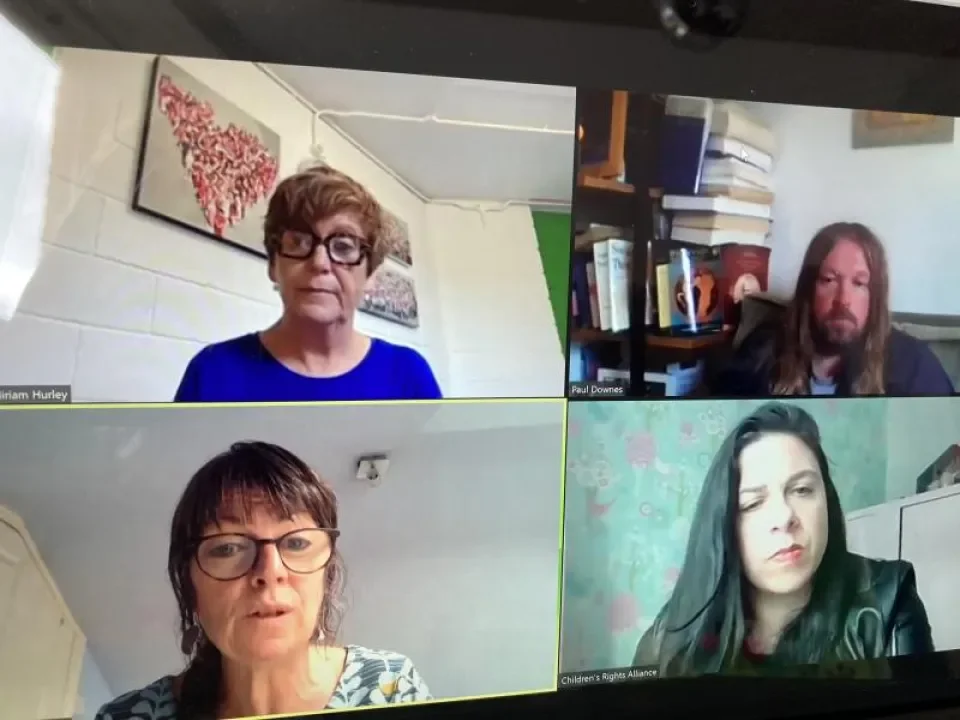
@CRA
@ChildRightsIRL. A huge thank you to our panel of speakers for joining us today, Prof Dympna Devine, @SchoolofEdUCD, Dr Paul Downes, @DCU and Miriam Hurley, Dalkey School Project @EducateTogether. #EdDisadvantage #edchatie #backtoschool
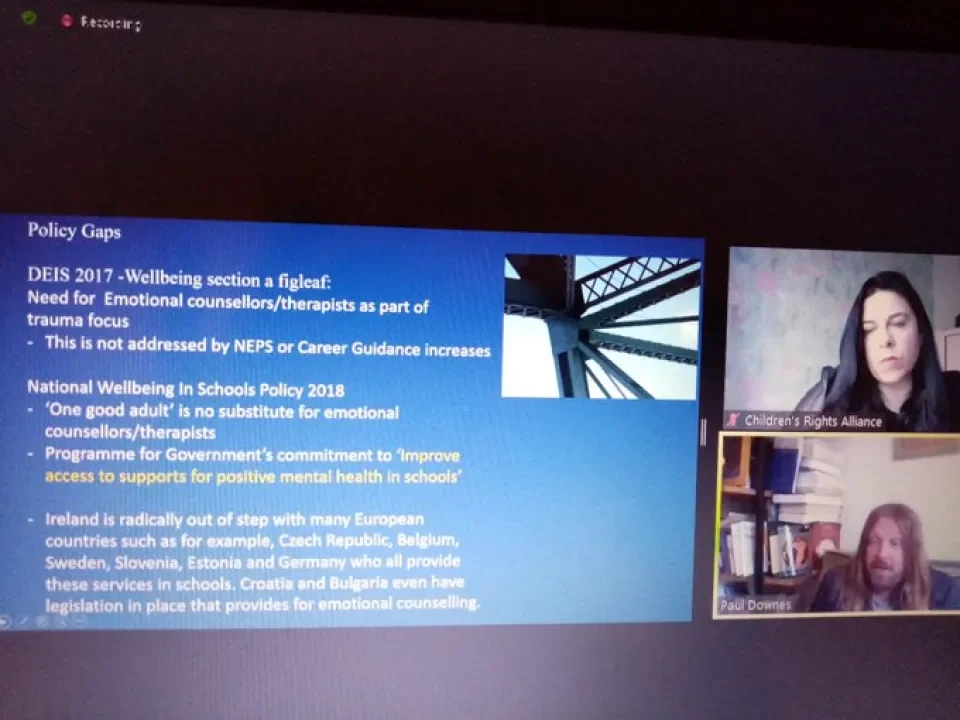
Figures on child poverty

Andy Burke
TRANSFORMING TEACHER EDUCATION IN THE WEST BANK AND GAZA: POLICY IMPLICATIONS FOR DEVELOPING COUNTRIES Andy Burke member of the Institute of Education's Educational Disadvantage Centre, is lead author of a recently published report for the World Bank, Transforming Teacher Education in the West Bank and Gaza : Policy Implications for Developing Countries.
This is a policy-related review of an eleven-year (2008-2019) teacher education reform project in the West Bank and Gaza in which Andy Burke was involved from beginning to end. The report has just been published by the World Bank in its Policy Research Working Paper series. The model of teacher education reform developed with their Palestinian colleagues is viewed as having potential for significant impact in other developing countries. It is already being adopted for implementation in The Gambia and Zambia.
NEW BLOG FOR BOOK BY PAUL DOWNES
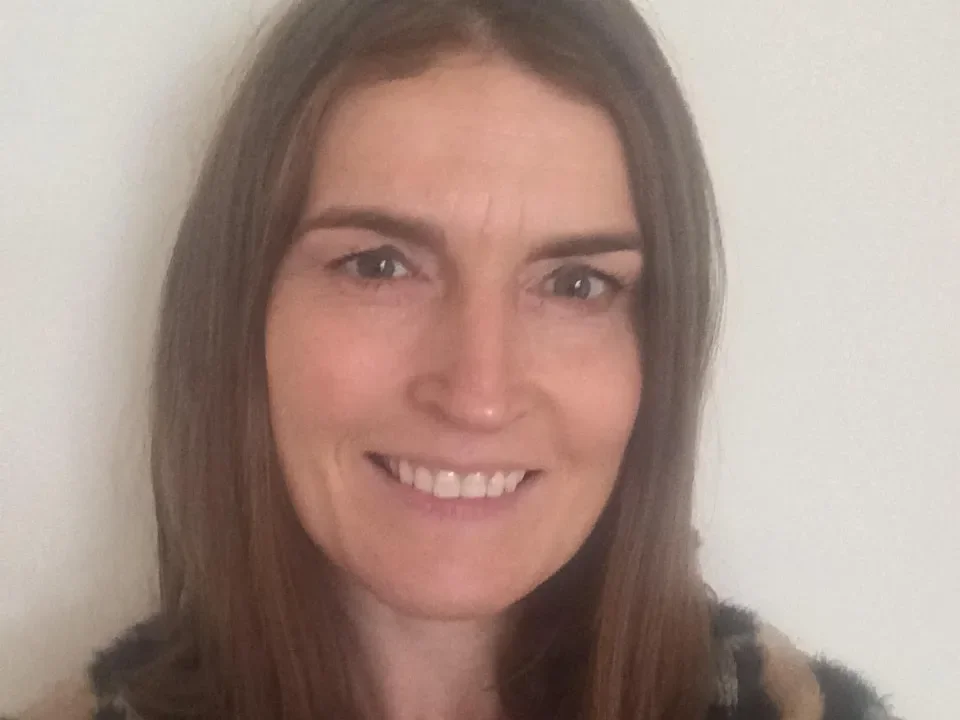
Fiona Murphy
GROWTH MINDSET AND CONSTRUCTIVISM IN A DEIS PRIMARY SCHOOL
Congratulations to Fiona Murphy (pictured), Research Associate with the Educational Disadvantage Centre and M.Ed Graduate, Poverty and Social Inclusion Special Option, on her target article with Dr. Hugh Gash, Growth Mindset and Constructivism in Irish Primary Schools: Implications of a Qualitative Study, published in the international journal Constructivist Foundations:
Murphy F. & Gash, H. (2020). I can’t yet and growth mindset. Constructivist Foundations, 15 (2): 83-94
As a target article, it was the subject of responses from 9 peer commentaries in the journal. These included from: Arne Engström Strömstad Academy, Sweden; Dewey I. Dykstra, Jr.Boise State University, USA; Michelo DelMonte Trinity College, Dublin, Ireland; Professor Leslie P. Steffe University of Georgia, USA; Professor Robert J. Martin Truman State University, USA; Philip Baron, University of Johannesburg, South Africa, as well as from DCU’s:
- Dr. Mary Shine Thompson: (2020). Growth Mindset and Constructivism in Irish Primary Schools: Implications of a Qualitative Study. Constructivist Foundations, 15 (2): 95-97
- Dr. Dolores Corcoran: (2020). I Never Knew I Was Good at Maths. Constructivist Foundations, 15 (2): 114-116 and
The authors’ response to these peer commentaries was also published:
Fiona Murphy’s lesson outlines for her Growth Mindset Classroom Intervention (GMCI) that was the basis of the study are available for schools on the Educational Disadvantage Centre website: https://www.dcu.ie/edc/Growth-Mindset-Classroom-Intervention.shtml-1
WHAT LONG TERM IMPACT WILL SCHOOL SHUTDOWN HAVE ON CHILDREN?
Irish Times, Saturday June 27th 2020.
Closing schools over Covid 19 is set to cause lasting harm, particularly for children with special needs and those from disadvantaged backgrounds, writes Carl O’Brien. READ MORE
Irish Independent 24th June 2020
READ PAUL DOWNES' AND NIAMH MURRAY'S FULL ARTICLE HERE
REVIEW OF PAUL DOWNES' RECONSTRUCTION AGENCY IN DEVELOPMENTAL AND EDUCATIONAL PSYCHOLOGY
SUPPORTING SPEECH, LANGUAGE AND COMMUNICATION IN THE PRIMARY CLASSROOM AND BEYOND: AN ONLINE SUMMER COURSE FOR PRIMARY SCHOOL TEACHERS IS A SUMMER COURSE OFFERED BY THE CHILDHOOD DEVELOPMENT INITIATIVE – CDI
This course is co-authored by Aoife Merrins Gallagher an experienced primary school teacher who is an INTO PhD candidate in the School of Language and Literacy in the Institute of Education in DCU and Dr Sylwia Kazmierczak-Murray, a CORU registered speech and language therapist who is a post-doctoral Research Associate with the Educational Disadvantage Centre. Both disciplines have merged to provide a practical, useful and informative summer course for teachers. This course has been approved by The Department of Education and Skills, participants qualify for 3 EPV days on course completion. READ MORE
DCU’S EDUCATIONAL DISADVANTAGE CENTRE LAPTOP APPEAL TO SUPPORT LOCAL STUDENTS
The Educational Disadvantage Centre in DCU’s Institute of Education has launched a laptop appeal to support students in local DEIS schools to continue their education remotely. READ MORE
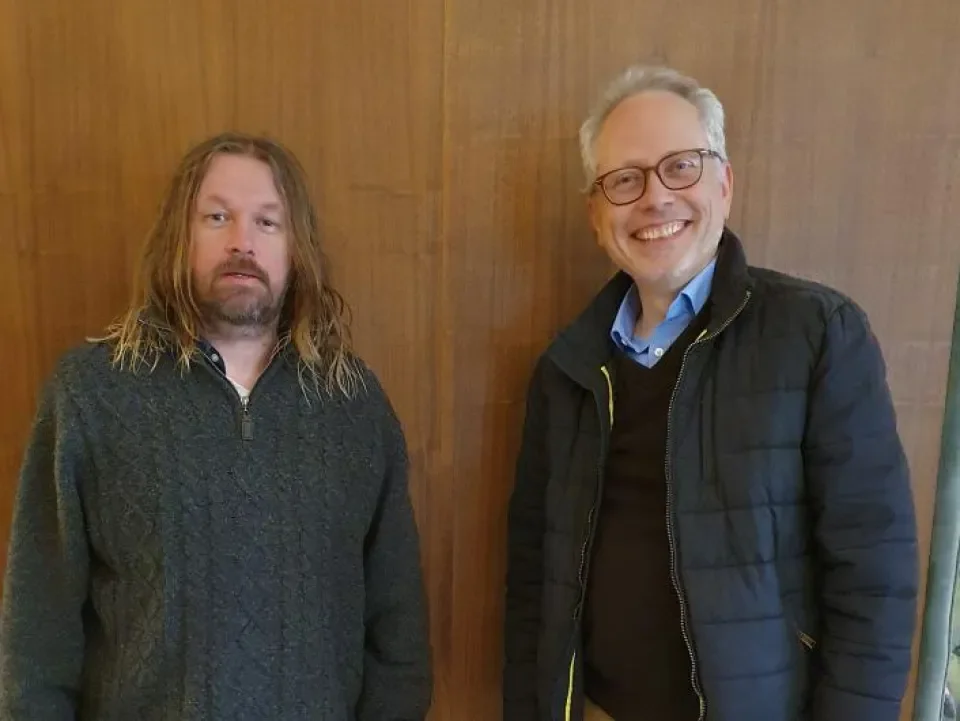
Paul Downes and Andrew McCoshan
VISITING RESEARCHER TO THE EDUCATIONAL DISADVANTAGE CENTRE
In early March one of our Senior Research Associates, Dr Andrew McCoshan, pictured here with Paul Downes, spent time at the Centre as a Visiting Researcher. Andrew is a research consultant who spends most of his time working on projects for the European Commission in the lifelong learning and vocational training fields. The visited provided an opportunity for Andrew to broaden his perspective on education and training, to strengthen connections with staff within the Centre and Institute of Education more broadly and to see some examples of how the Centre is actively engaging with local communities.
Andrew had discussions with a number of members of the Centre with similar interests to his own. ‘They provided an excellent opportunity to share experiences and identify areas where we might work together in the future’, he says. With a background in geography, Andrew was particularly interested to learn more about the Centre’s community activities and had the chance to accompany Centre Director Paul Downes and Hub Coordinator Elaine Davis on a visit to the Kilbarrack Lifelong Community Learning Hub. ‘I spend too much time sitting behind a computer researching policies related to poverty and social inclusion in education’, Andrew notes, ‘so it was excellent to get out and see one in practice, especially one designed to get local people into teaching – I don’t think I’ve come across that before. It was really inspirational.’
We look forward to welcoming Andrew back in the near future. Read more about Andrew HERE
REPORT INTO EARLY SCHOOL LEAVING IN COUNTY CARLOW PUBLISHED
Retention Rates of Leaving Certificate in County Carlow, authored by Davina Brady. Published and commissioned by Carlow County Development Partnership. Foreword by Dr Paul Downes, who also spoke to launch the report. READ MORE
BULLYING AMONG MAIN REASONS PEOPLE IN CARLOW LEAVE SCHOOL EARLY
KCLR 96FM News & Sport. Thursday February 27th 2020
The need for emotional therapy and counsellors in schools has been highlighted in a new report on early school leavers in Carlow. Research was commissioned by the Carlow County Development Partnership in light of statistics which found the county had one of the highest rates of early leavers in the country. READ MORE
Paul Downes (@23 mins) and Dylan Thomas, from Carlow County Development Partnership (@31 mins), spoke with Eimear Ní Bhraonáin of KCLR 96 FM. LISTEN HERE
Paul Downes (@21.45) spoke on Kildare FM’s Kildare Focus. LISTEN HERE
STUDY FINDS STUDENTS LEAVING SCHOOLS DUE TO BULLYING
Breakingnews.ie, Thursday 27th February 2020
Bullying is one of the main reasons young people leave school early. That was the finding of a new report on early school leaving in Carlow. The report also found half of young people who leave mainstream school early quit for mental health reasons.
"There are serious gaps in our system around emotionally counselling supports for young people in Carlow affecting their early school leaving today, said Dr Paul Downes, from the Educational Disadvantage Centre in DCU. "This is an issue not only of relevance in Carlow but points to failures of national policy also." READ MORE
LETTERS TO THE EDITOR: NEW DÁIL MUST TRY TO ELIMINATE CHILD POVERTY
Irish Examiner, Thursday February 20th 2020
On this, the United Nations’ (UN) World Day of Social Justice, it is imperative that we take action to tackle poverty, social and economic exclusion and unemployment.
We, the undersigned, call on the incoming government to prioritise the elimination of child poverty in any programme for government. Too many children in Ireland experience poverty. We see the impact of such poverty every day, on school attendance, academic achievement, participation, social engagement and educational aspirations. Supporting children and young people to stay in school and supporting their performance and attainment is crucial to tackling child poverty and social inequality.
However, large class sizes, poverty and homelessness make it very difficult for children to properly engage at school. Too many children travel long distances every day from their emergency accommodation to their school. Too many children don’t have access to laundry facilities or a hot nutritious meal at school. Too many children are struggling without access to emotional supports and counselling.
We need a clear cross-departmental strategy and increased investment to prioritise children’s rights to decent housing, healthcare, free education and comprehensive youth services. We are asking both government and members of the 33rd Dáil to make the right choices for children to ensure that Ireland is a country where every child, regardless of their circumstance, can reach their full potential.
Suzanne Connolly, CEO, Barnardos; Tanya Ward, CEO, Children’s Rights Alliance; Dr Paul Downes, Director, Educational Disadvantage Centre, DCU; Pat Dennigan, CEO, Focus Ireland; John Boyle, General Secretary, INTO; Kieran Stafford, National President, Society of St Vincent de Paul.
CHILDREN'S CHARITIES CALL FOR ACTION ON CHILD POVERTY BY NEXT GOVERNMENT
Irish Examiner, Thursday February 20th 2020
Too many children are living in consistent poverty - with no access to hot meals at school or access to counselling. That's according to a number of charities who have written a letter to coincide with today's UN's World Day of Social Justice. READ MORE
Covered also in regional media:
CHILDREN’S CHARITIES CALL FOR ACTION ON CHILD POVERTY BY NEXT GOVERNMENT
Western People Thursday 20th February 2020
Too many children are living in consistent poverty – with no access to hot meals at school or access to counselling. The charities say too many children are homeless and travel long distances to school from emergency accommodation. That’s according to a number of charities who have written a letter to coincide with today’s UN’s World Day of Social Justice. READ MORE
CHILDREN’S CHARITIES CALL FOR ACTION ON CHILD POVERTY BY NEXT GOVERNMENT
Kildare Nationalist, Thursday 20th February 2020
Too many children are living in consistent poverty – with no access to hot meals at school or access to counselling. The charities say too many children are homeless and travel long distances to school from emergency accommodation. That’s according to a number of charities who have written a letter to coincide with today’s UN’s World Day of Social Justice. READ MORE
CHILDREN’S CHARITIES CALL FOR ACTION ON CHILD POVERTY BY NEXT GOVERNMENT
Laois Nationalist, Thursday 20th February 2020
Too many children are living in consistent poverty – with no access to hot meals at school or access to counselling. The charities say too many children are homeless and travel long distances to school from emergency accommodation. That’s according to a number of charities who have written a letter to coincide with today’s UN’s World Day of Social Justice. READ MORE
OVER 2,000 PROJECTS IN DISADVANTAGED COMMUNITIES SUPPORTED THROUGH COMMUNITY ENHANCEMENT PROGRAMME
Gov.ie. January 3rd 2020
Mr Michael Ring TD, the Minister for Rural and Community Development, has today (Friday 3rd January) confirmed that 2,106 community initiatives around the country have been allocated a total of €4,524,124 under his Department’s Community Enhancement Programme. READ MORE
REPORT FRAMEWORK FEATURED IN HARVARD’S SOCIAL EMOTIONAL LEARNING HUB
The Social and Emotional Education (SEE) framework developed in the report published by the EU Commission of which Dr Paul Downes, Associate Professor of Education (Psychology), School of Human Development, Institute of Education is a co-author has been included as one of the frameworks in the Harvard University Explore SEL (social and emotional learning) – an interactive hub providing education leaders and decision-makers with tools and targeted knowledge to address their priorities. The tools and resources on this site support exploring, connecting, and comparing SEL frameworks and skills to build a broader and deeper understanding of SEL and related fields, to grow clarity and transparency, and to enable users to select a framework to guide their SEL work, and more. The Report framework is featured under the title ‘EU NESET Framework for Social and Emotional Education‘.
This report Cefai, C., Bartolo P. A., Cavioni. V., Downes, P. (2018). Strengthening Social and Emotional Education as a core curricular area across the EU: A review of the international evidence. Luxembourg: Publications Office of the European Union/EU bookshop was centrally cited as a key rationale by the EU Commission in its supporting documents for the new EU Key Competence for Lifelong Learning Framework, Personal, Social and Learning to Learn. Dr Downes also gave the opening keynote presentation, Developing a holistic, differentiated, systemic framework for social and emotional education, at the international conference, Do We Need a Relational Revolution in Schools? Social, Emotional and Intercultural Competences for Inclusive Societies, Croatia, 28th & 29th January 2019 He wrote the foreword to the book, Ana Kozina (ed.) Social, emotional and intercultural competencies for inclusive school environments across Europe: Relationships matter. Hamburg: Verlag Dr. Kovač, launched at the conference. The book is based on a research project across Slovenia, Denmark, Sweden, Croatia and Germany.
EUROPEAN COMMISSION VIDEO ON EARLY SCHOOL LEAVING HEADLINE TARGET
The European Commission’s Directorate General Education and Culture has released a new video on the importance of preventing early school leaving and its strategic centrality to EU policy making in the context of early school leaving prevention being an ET2020 Headline Target. Dr Paul Downes, Director of the Educational Disadvantage Centre, Associate Professor of Education (Psychology) in the Institute of Education, DCU was a contributor to the video regarding the impact of early school leaving.
Contributors to the video also include the Austrian Minister for Education, Science & Research, Iris Eliisa Rauskala on the need for inter-Departmental collaboration between Education and Social Systems, and the French Minister for Education, Jean-Michel Blanquer, on school climate and parental involvement. Other contributors include the Swedish Minister for Education, Anna Ekstrom and Michael Teutsch, Head of the EU Commission’s Unit for Schools and Multilingualism.
2019 NEWS
MAJOR NEW STUDY ON EDUCATION AND HOMELESSNESS CALLS FOR NEW INITIATIVES TO PROTECT VULNERABLE STUDENTS
A major new research report, by DCU’s Educational Disadvantage Centre and Peter McVerry Trust, on young homeless men’s experiences of the education system has found a widespread need for reforms and additional supports for vulnerable young people in the education system. The report, Educational Gaps and Future Solutions sets out seven key recommendations to improve young people’s educational experiences and reduce risks of homelessness in the future.
Speaking at the publication of the report today, CEO of Peter McVerry Trust Pat Doyle said, “This new and important research allows Peter McVerry Trust to move beyond anecdotal reports from service users about their interaction with the education system and establish a robust evidence basis for our future work and for the education strategies of the state".
Mr Doyle said the education system presents an opportunity to encourage positive outcomes for young people and prevent homelessness for vulnerable young people: “Given the early age and length of time people will engage with the education system, it presents the best opportunity to positively impact on life outcomes for people. That is particularly true for those who may be more vulnerable or likely to experience homelessness due to their life circumstances".
At the time that these research interviews were undertaken, there were 104 participants aged 18 - 38 years of age staying in Peter McVerry Trust’s services who had been educated in Ireland. As a result, this study’s sample of 51 participants constitutes 29.6% of all eligible participants.
Key findings:
● Significant deterioration in the interviewees’ experiences of education following their transition from primary to secondary school
● Rates of suspension and expulsion from school significantly higher than the national average, with 55% of participants having experienced reduced access to education via suspension, rolling suspension or expulsion
● 68% indicated that they had experienced ‘traumatic childhood events’
● Inadequate emotional counselling and therapeutic supports in and around schools
● The challenge and barriers to education when accessing emergency homeless accommodation yet 79% of participants interested in further education or training.
Sarah Murphy, lead author and Research Associate with the Educational Disadvantage Centre, DCU Institute of Education, said:
"This report reveals a range of preventable system failures in the Irish education system that are still ongoing today. These failures increase the risk of exclusion from the system and participation in society with knock-on impacts that heighten the risks of homelessness.
The high number of participants who were suspended or expelled from school supports a call for a national target of no student to be suspended or expelled from school but to instead be given adequate multidisciplinary team supports at both primary and post primary levels.
Furthermore, the high levels of those who have experienced trauma and with little or limited emotional counselling or therapeutic supports in and around their school is a glaring gap in supports to prevent trauma impacting on wider parts of a young person's life".
Among the recommendations of the research is a call for the Department of Education to make a new funding stream available for mental health supports for young people, to include specialised counselling services to address emotional issues and trauma experienced by vulnerable and at risk young students. The report recommends the establishment of a distinct funding strand to develop Community Lifelong Learning Centres, to meet the diverse holistic educational needs of vulnerable young people. The report also calls for the Department of Education and Skills, together with the Teaching Council, to provide and lead a strategic commitment to enhance focus on conflict resolution skills for secondary school teachers through initial teacher education and professional development programmes. Access the report here:
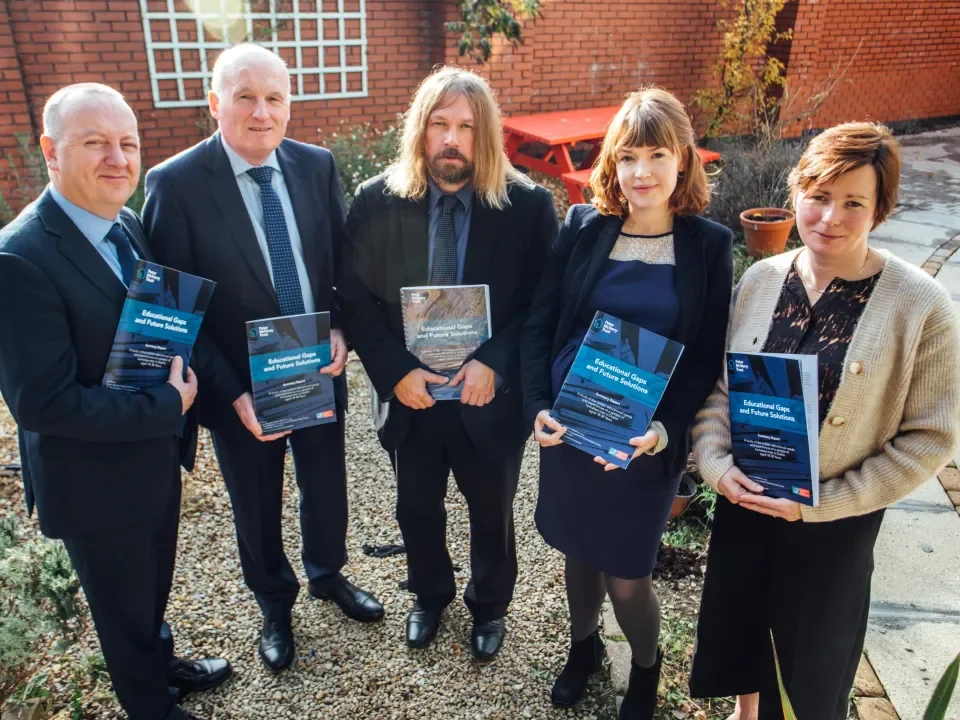
Launch of Peter McVerry Trust Report
MAJOR NEW STUDY ON EDUCATION AND HOMELESSNESS CALLS FOR NEW INITIATIVES TO PROTECT VULNERABLE STUDENTS
DIFFICULTIES IN EDUCATION CAN CONTRIBUTE TO HOMELESSNESS, REPORT FINDS
CatholicIreland.net,Thursday November 7th 2019
The research allows the Peter McVerry Trust to move beyond anecdotal reports from young men who use homeless services about how they fared in the education system and it will help influence the future education strategies of the State, writes Ann Marie Foley. READ MORE
Watch Peter McVerry Trust and DCU’s Educational Disadvantage Centre’s research discussed here.
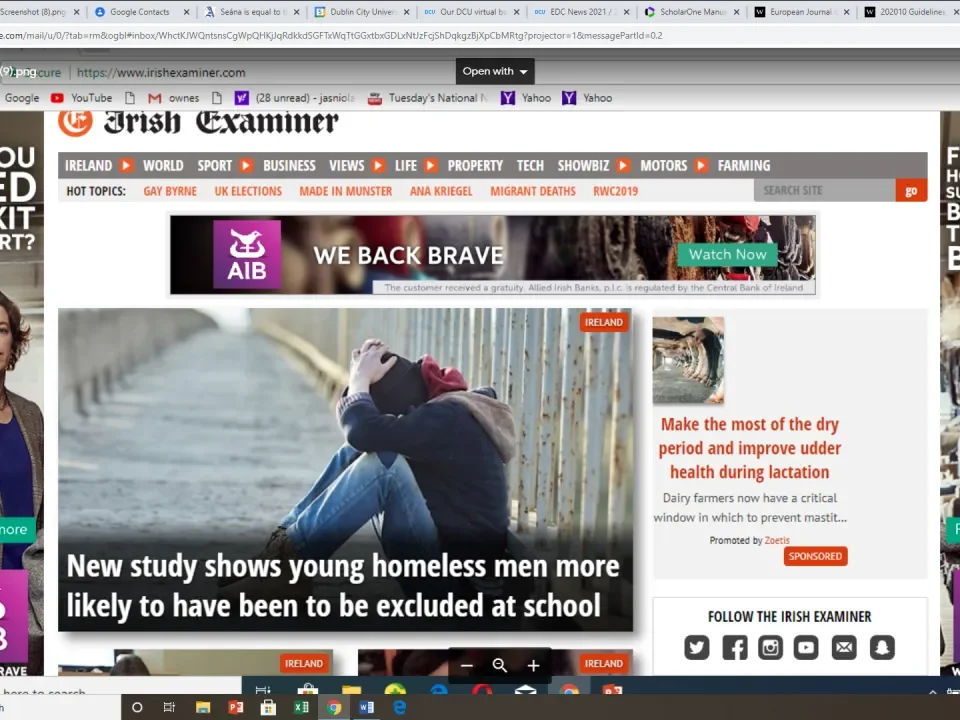
Irish Examiner November 6th 2019
NEW STUDY SHOWS YOUNG HOMELESS MEN MORE LIKELY TO HAVE BEEN TO BE EXCLUDED AT SCHOOL
Young homeless men are more likely to have been excluded from school, either through suspension or expulsion, a new study examining their experiences of the education system has found, writes Jess Casey. Irish Examiner, November 6th 2019. READ MORE
PETER MCVERRY TRUST AND DCU'S STUDY ON EDUCATION AND HOMELESSNESS CALLS FOR NEW INITIATIVES FOR VULNERABLE STUDENTS
A major new research report, by DCU’s Educational Disadvantage Centre and Peter McVerry Trust, on young homeless men’s experiences of the education system has found a widespread need for reforms and additional supports for vulnerable young people in the education system. The report, Educational Gaps and Future Solutions, sets out seven key recommendations to improve young people’s educational experiences and reduce the risks of homelessness in the future. Peter McVerry Trust, November 6th 2019, READ MORE
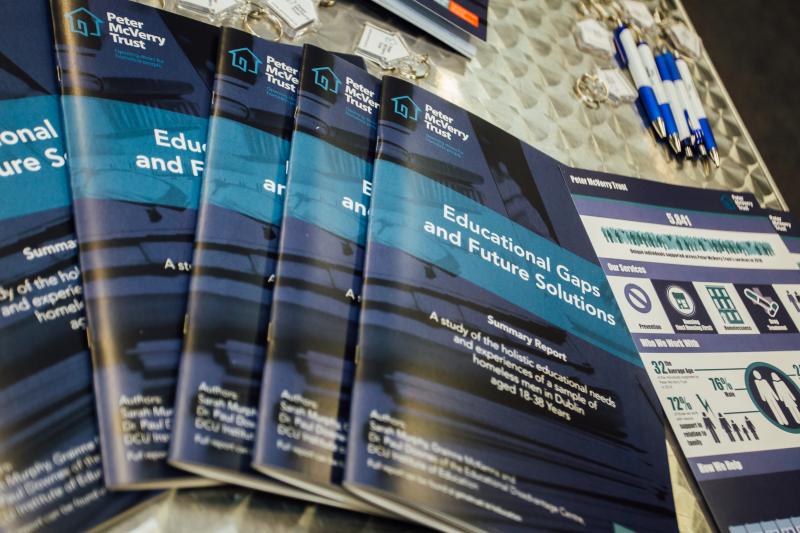
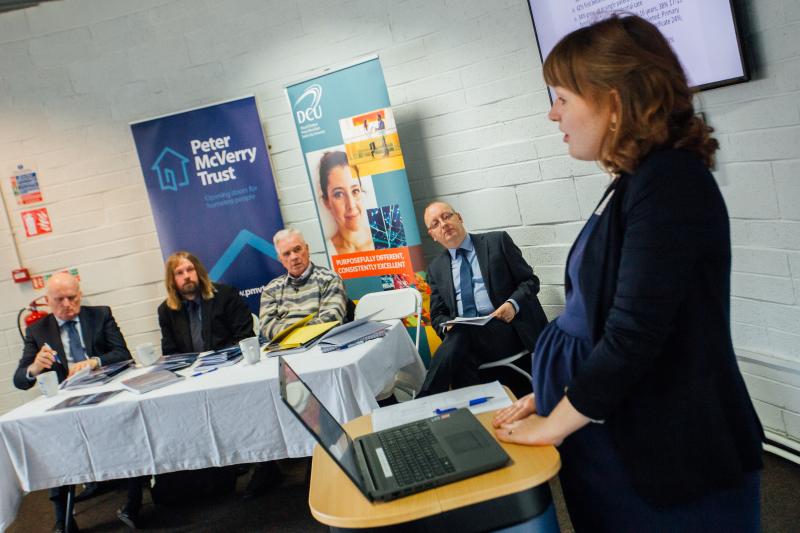
OVER HALF OF HOMELESS MEN MISSED EDUCATION DUE TO EXPULSION OR SUSPENSION
Report calls for better student support instead of expelling or suspending pupils, write Mark Hilliard and Carl O’Brien. Irish Times, November 6th 2019. READ MORE
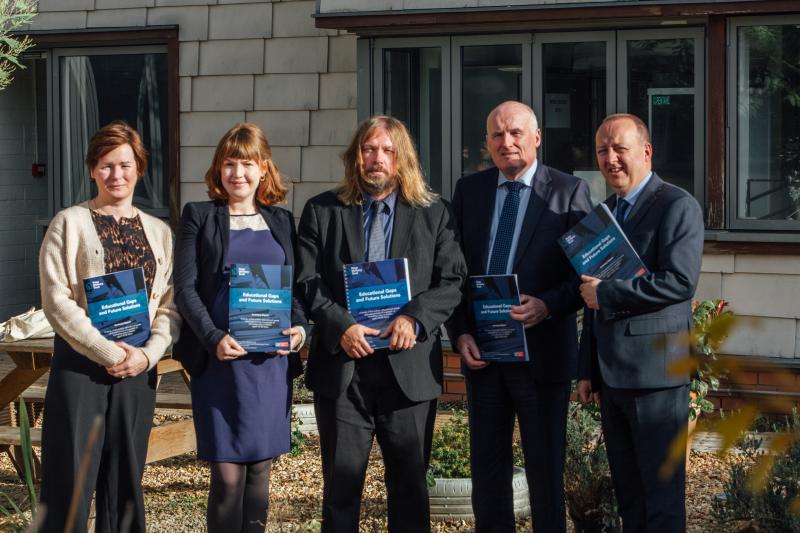
THE IRISH TIMES VIEW ON SCHOOL ABSENTEEISM: THE LEFT-BEHIND
Many vulnerable children are slipping through the cracks of the education system due to largely preventable system failures. Irish Times, November 6th, 2019 READ MORE
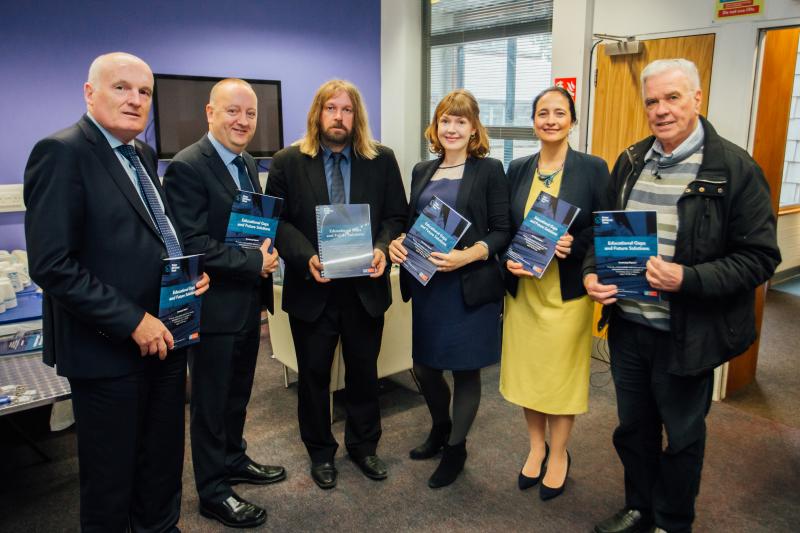
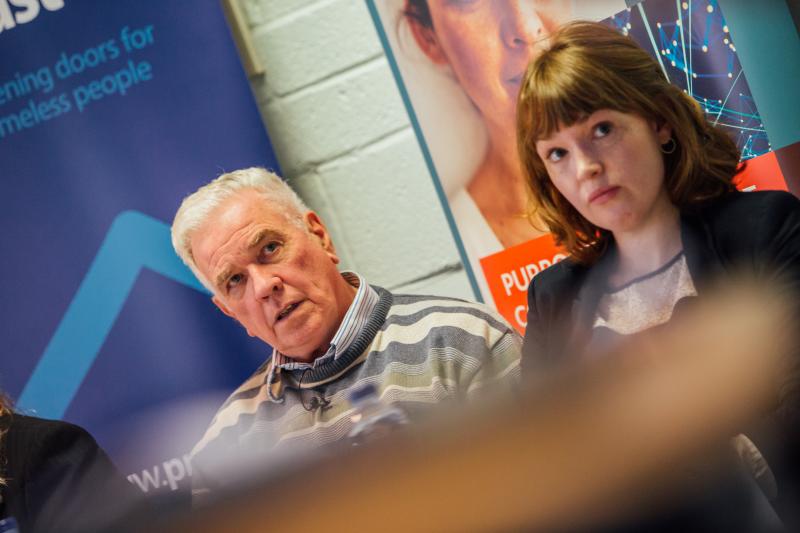
SUSPENSIONS AND EXPULSIONS OF BOYS FROM SCHOOL LINKED TO HOMELESSNESS
Irish Independent, November 7th 2019. READ MORE
An end to pupil suspensions and expulsions is called for in a new study that draws a link between unhappy educational experiences and homelessness among young men, writes Katherine Donnelly. Irish Independent, November 7th 2019. READ MORE
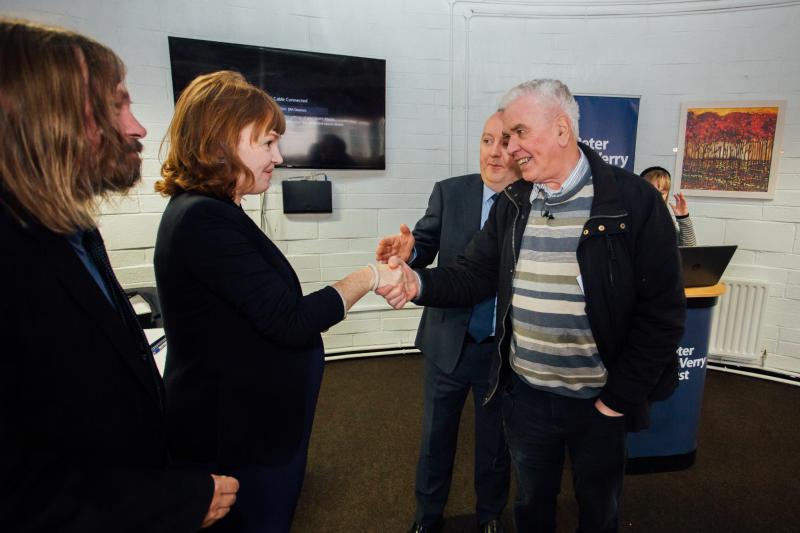
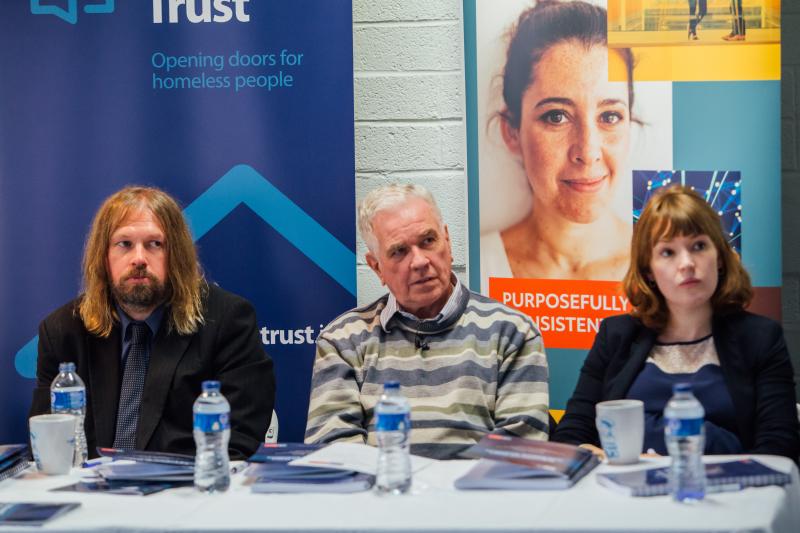
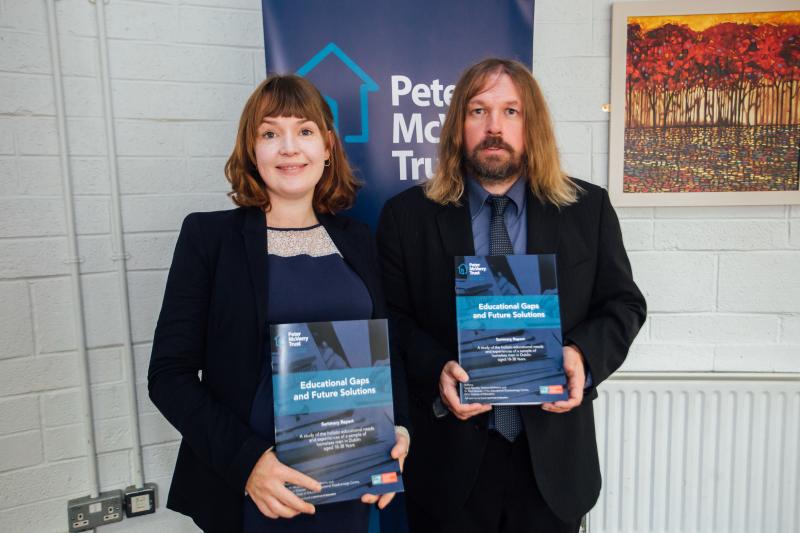
HALF OF HOMELESS MEN ‘EXPELLED OR SUSPENDED AT SCHOOL’
Students should never be suspended or expelled from school and instead should be helped with their behaviour, an academic from Dublin City University has said, writes Ronan Early. Times UK, November 6th 2019. READ MORE
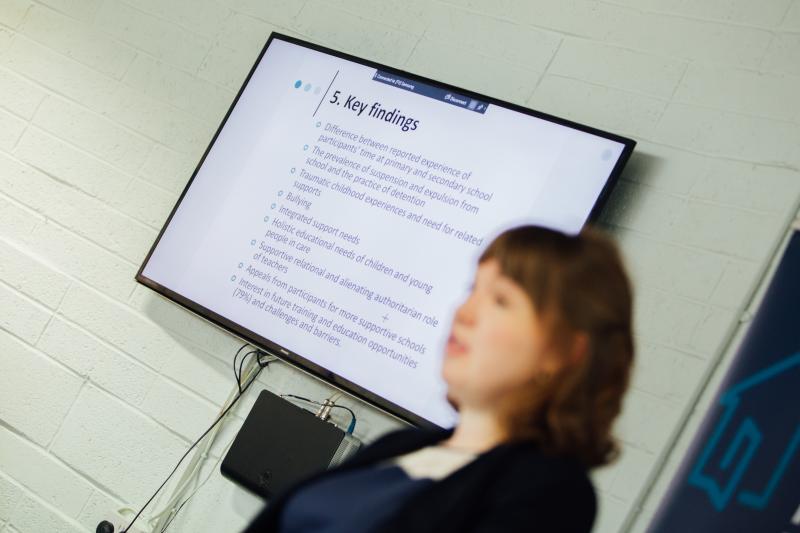
THE LINKS BETWEEN ADVERSE SCHOOL EXPERIENCES AND HOMELESSNESS
Opinion: new research on education and homelessness calls for initiatives to support vulnerable students and homeless people, writes Sarah Murphy. (pictured below). RTE.ie / Brainstorm November 6th 2019. READ MORE
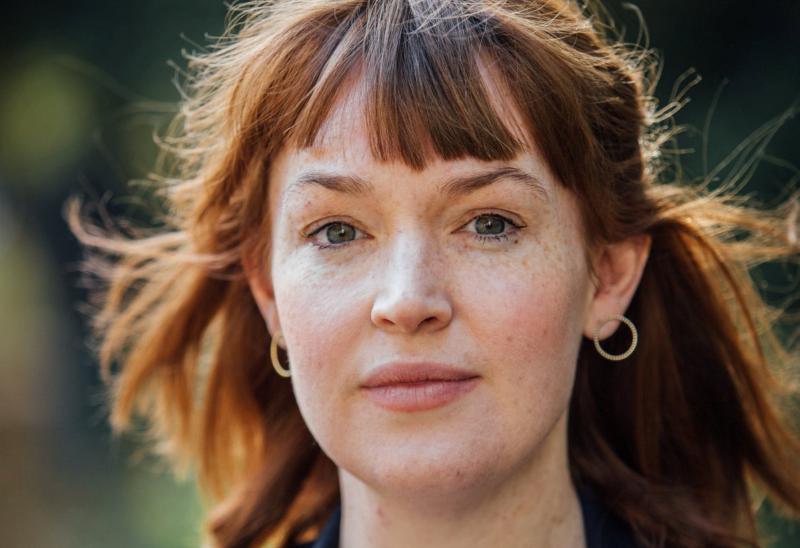
'THE TEACHERS HATED ME': HIGH RATE OF SCHOOL SUSPENSIONS AMONG HOMELESS MEN REVEALED BY NEW STUDY
Failings in the school system increase the risk of homelessness, according to a new study. Homeless men are more likely to have faced suspension and exclusion from school, a new study from Dublin City University suggests. The Journal, November 6th 2019. READ MORE
MORNING IRELAND'S IT SAYS IN THE PAPERS, RADIO 1, WEDNESDAY NOVEMBER 6TH 2019
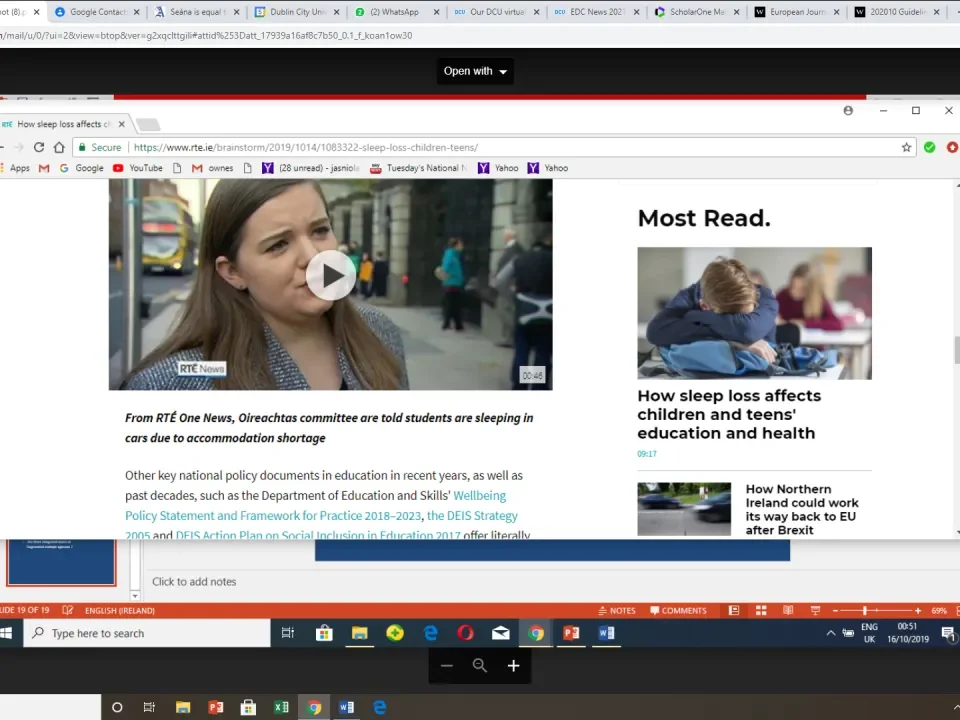
RTE October 15th 2019
MOST READ: HOW SLEEP LOSS AFFECTS CHILDREN AND TEENS' EDUCATION AND HEALTH
RTE.ie Tuesday October 15th 2019
Opinion: successive Irish governments have been asleep at the wheel in relation to sleep loss in children and young people. Irish policy makers need to wake up to the issue of sleep loss affecting children and young people's education and health. Most children and young people need at least nine hours of restful sleep each night. Sleep loss impacts on a wide range of aspects in a child’s education, such as his/her attention, reasoning, memory, motivation and school performance, as well as social and behavioural aspects, such as interaction with both teachers and peers, writes Paul Downes, DCU. READ MORE
INTERNATIONAL KEYNOTE PRESENTATIONS ON EARLY SCHOOL LEAVING: DR PAUL DOWNES
Dr Paul Downes gave two keynote presentations at Education Ministry Fora in Finland and Malta. The title of his keynote presentation at the Finnish National Agency for Education, Flexible Basic Education Forum, Lahti, Finland, September 23-24, 2019 was Beyond resilience to inclusive systems for prevention of early school leaving in Europe: A spatial-relational approach.
Dr Downes' other keynote presentation was from ELET (Early Leaving from Education and Training) Prevention to Promoting Inclusive Systems as Concentric Relational Space: Future Steps for a Holistic, Differentiated Systemic Vision across Europe. This took place at the ELET – The Way Forward, International Conference, The Directorate for Research, Lifelong Learning and Employability, Ministry of Education and Employment, President’s Palace, Malta, November 27-29, 2019. This presentation can be accessed HERE
Both presentations were based on his new book, Reconstructing agency in developmental and educational psychology: Inclusive Systems as Concentric Space. New York/London/New Delhi: Routledge
DCU STUDY SHOWS SCHOOL AND HOME INTERVENTIONS CAN IMPROVE CHILDREN’S POOR SLEEP HABITS
A Dublin City University study shows a notable improvement in children’s sleep behaviours by implementing a short school and home-based programme.
The link between inadequate sleep levels in children and poor engagement with school is well documented, with poor sleep duration causing excessive daytime sleepiness, which leads to problems with concentration, attention and cognitive functioning.
This study carried out at the Educational Disadvantage Centre, DCU Institute of Education, has found that by implementing a five-week intervention programme, the attitudes of school children towards their own sleep behaviour, their motivation to improve their sleep health and their approach to using electronic media before bedtime, greatly improves.
KEY FINDINGS:
Notable improvement in child-reported daytime sleepiness, particularly among high-risk children - 63% of participants reported feeling that they needed more sleep going to school, post-intervention this was reduced to 32%.
Improvements in both weekday and weekend bed and wake times, with an increase in children going to bed before 11pm post intervention - before the intervention, 75% of the group were going to bed before 11pm, post-intervention, this rose to 96%. Post-intervention, 75% of the group reported that they would go to bed earlier in future.
Increased awareness of the negative impacts of the use of electronic media on sleep
The programme includes curricular-based lessons on sleep health in school; parental involvement in the form of an information session with a professional sleep health consultant; and sleep diaries by children, allowing them to reflect on their own sleeping habits.
Commenting on the study, Dr Paul Downes, Director of the Educational Disadvantage Centre and co-author of the report, said:
“This inexpensive, brief intervention reveals real change in sleep behaviour patterns on nights before schooldays and awareness of this issue among these pupils in this DEIS primary school, albeit in this small sample. It offers real promise for replication and development elsewhere. Previous research carried out for the Educational Disadvantage Research Centre has shown that almost two-thirds of pupils were taught by teachers who said that their teaching was limited to some extent or a lot because pupils were not getting enough sleep. This intervention, which is innovative in its approach, provides a possible model for implementing a sleep health programme in the Irish primary curriculum to address the current Irish national policy neglect of this issue. There is a glaring silence on this key educational and health issue of sleep deficits which will hopefully be remedied in the next National Children's Policy Framework. We would certainly welcome a broader investigation into the potential of school-based interventions.”
STUDY SAYS SCHOOL INTERVENTION CAN HELP POOR SLEEPERS
Irish Examiner, Monday October 14th 2019
Simple interventions at school and at home can improve children's poor sleep habits, writes Sarah Slater. READ MORE
SCHOOL INTERVENTION IN SLEEP MAY HELP CHILDREN GET TO BED EARLIER, NEW STUDY FINDS
The Journal.ie Monday October 14th 2019
A sleeping programme taught in school and at home might be the answer to improving children’s sleep behaviour, according to a study by Dublin City University (DCU). As part of the study, 24 sixth-class children in an urban DEIS primary school were taught a sleep-based class by their teacher at school and their parents at home for five weeks. A study of sixth-class pupils found a 21% rise in those going to bed before 11pm after learning more about sleep, writes Orla Dwyer. READ MORE
STUDY PERSUADES PUPILS TO SHUN PHONES BEFORE BED
The Times Monday October 14th 2019
Primary schoolchildren are three times more likely to believe they should avoid using electronic devices an hour before bedtime after they took part in a study on sleep. A Dublin City University study that sought to monitor and change the sleeping habits of 24 sixth-class pupils in a disadvantaged area reported an “increased awareness of the negative impacts of the use of electronic media on sleep”. Before the five-week study, less than one in five children agreed that they should not use electronic devices an hour before bedtime. After the study, almost half of the children agreed with the statement. The study found that after the “five-week intervention period” where children were asked to record times they went to bed, woke and how they felt, writes Ronan Early
BEDTIME 'TOO LATE' FOR SCHOOL CHILDREN WHO SUFFER SLEEP DEPRIVATION
Irish Independent, Monday October 14th 2019
Huge levels of sleep deprivation among 11 and 12 year olds in a disadvantaged area have emerged in a new study showing that a quarter were not in bed before 11pm. A further one in three (33pc) were only tucked up between 10pm and 11pm. There was a dramatic improvement in sleep habits after a trial conducted by researchers at the Dublin City University (DCU) Educational Disadvantage Centre writes Katherine Donnelly. READ MORE
DCU STUDY ON HOW TO IMPROVE CHILDREN’S POOR SLEEP HABITS
Schooldays Newshound, Monday October 14th 2019
A Dublin City University study shows a notable improvement in children’s sleep behaviours by implementing a short school and home-based programme. The link between inadequate sleep levels in children and poor engagement with school is well documented, with poor sleep duration causing excessive daytime sleepiness, which leads to problems with concentration, attention and cognitive functioning. This study carried out at the Educational Disadvantage Centre, DCU Institute of Education, has found that by implementing a five-week intervention programme, the attitudes of school children towards their own sleep behaviour, their motivation to improve their sleep health and their approach to using electronic media before bedtime, greatly improves. READ MORE
SCHOOL SHOULD IMPROVE SLEEP
Irish Daily Star. Monday October 14th 2019
School and home help can can improve children's poor sleep habits a study shows. READ MORE
SCHOOL KIDS REST BETTER ON UNI PLAN
The Sun, Monday October 14th 2019
School and home interventions can improve children's poor sleep habits a new study claims, writes Aoife Bannon. READ MORE
STUDY SHOWS SCHOOL AND HOME INTERVENTIONS CAN IMPROVE CHILDREN'S POOR SLEEP HABITS
Irish News, Monday October 14th 2019
Pupils improved their awareness of the negative impacts of the use of electronic media on sleep
Children's poor sleep can be improved greatly by teaching better habits in school and home, research has found. A Dublin City University (DCU) study showed a notable improvement after five weeks writes Simon Doyle. READ MORE
Listen back to Ciara Kelly's Newstalk interview with Paul Downes, Monday October 14th 2019 Lunchtime Live from 1.29.55 onwards
Listen back to Ciara Plunkett's FM Radio Kildare interview with Paul Downes, Monday October 14th 2019 Kildare Focus from 12.10 onwards
Listen back to Ciara Hargadon's Midwest Radio interview here
PARENTS OF OVER 200 CHILDREN ISSUED WITH LEGAL PROCEEDINGS OVER SCHOOL ATTENDANCE
Newstalk, Thursday November 21st 2019
More than 200 children have attended school so little over the past two years that their parents or guardians have been issued with legal proceedings by Tusla writes Eoghan Murphy. READ MORE
INTERVIEW WITH DR PAUL DOWNES ON SCHOOL ATTENDANCE ISSUES: RADIO NEWS FEATURES. THURSDAY NOVEMBER 21ST 2019. NEWS ON THE HOUR FROM 6AM TO 10AM
HOT SCHOOL MEALS SHOULD BE A ROUTINE FACT OF IRISH LIFE
Irish Times, Saturday October 12th 2019
Patchiness of Government scheme shows up the extent of food extremes that coexist here, writes Diarmaid Ferriter. READ MORE
Paul Downes' interview (p14-15) in 'Skill Set and Match' , CEDEFOP's September 2019 issue can be READ HERE
37 COUNTRY REVIEW OF EARLY SCHOOL LEAVING HEADLINE TARGET PUBLISHED BY EU COMMISSION: DR PAUL DOWNES
Dr Paul Downes, Associate Professor of Education (Psychology), Director of DCU’s Educational Disadvantage Centre, Institute of Education is co-author of a major review of early school leaving policies across 37 European countries just published by the European Commission, Assessment of the implementation of the 2011 Council Recommendation on Policies to Reduce Early School Leaving (Donlevy, Day, Andriescu & Downes 2019)
This formal review for the Commission operates against the background of Early School Leaving being one of the two headline EU2020 targets for all of education across the European Union. It examines the progress of all EU member states in reducing early school leaving, in developing national policies and strategies, and in implementing the concrete recommendations of the 2011 Council Recommendation on Early School Leaving in their national strategies over the past decade.
The study covers 37 countries, the EU 28, the 4 EFTA countries (Iceland, Liechtenstein, Switzerland, Norway) and the 5 EU candidate countries (Albania, Montenegro, North Macedonia, Serbia, Turkey). As well as reviewing Early School Leaving national strategies and policies across all these countries, 10 of the 37 countries were selected for more detailed case studies, including Ireland.
The review extracted ‘heat maps’ of structural indicators identified as key for system development and reform for early school leaving prevention, intervention and compensation, building on the evidence-informed EU policy documents in this area since the 2011 Recommendation.
The review sets out a range of key policy recommendations for the EU Commission and National Governments on this issue. These recommendations will inform the post-ET2020 Education planning regarding headline targets in education, Erasmus + and European Social Fund (ESF) funding strands regarding early school leaving and social inclusion measures generally. The report also outlines recommendations for dialogue between the EU Commission and the international research community regarding early school leaving, including dialogue with universities with regard to initial teacher education on this issue.
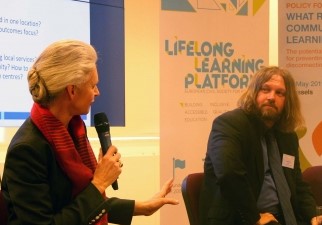
TWO NEW BOOKS BY DR. PAUL DOWNES, PUBLISHED BY ROUTLEDGE
DR PAUL DOWNES ADDRESSES EU PRESIDENCY FORUM ON THE ROLE OF COMMUNITY LIFELONG LEARNING CENTRES IN SUPPORTING MARGINALISED STUDENTS
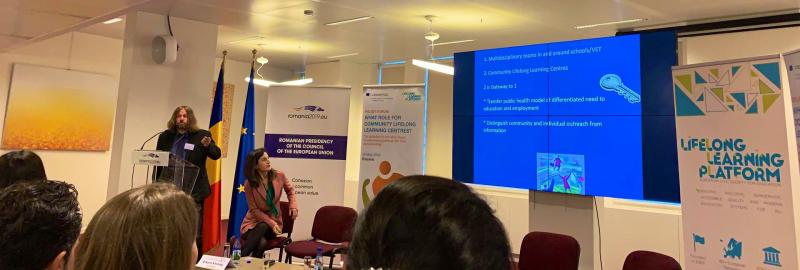
The Romanian EU Presidency and Cedefop Policy forum: What role for community lifelong learning centres? The potential of one-stop shops for preventing youth at risk from disconnecting took place in Brussels, on May 29th, 2019.
Dr Paul Downes, Associate Professor of Education (Psychology) and Director of the Educational Disadvantage Centre at DCU’s Institute of Education, gave an invited presentation Community Lifelong Learning Centres as a Gateway to Multidisciplinary Support Teams to set out the framework for the Forum’s dialogue. The Forum contributors included: Michael Teutsch, Head of Unit for Schools, DG Education, Youth, Sport and Culture, European Commission; Dr Max Uebe, Head of Unit, Employment Strategy, DG Employment, Social Affairs & Inclusion, European Commission; Johanna Koponen, Counsellor, Permanent Representation of Finland to the European Union and Professor João Costa, The Secretary of State for Education, Portugal.
The Romanian EU Presidency and Cedefop Policy Forum is a direct expansion on the Roundtable on this theme hosted by the Educational Disadvantage Centre, in the Institute of Education, DCU in September 2017, attended by the EU Commission and Cedefop (the EU Commission’s Centre for Vocational Education and Training). The Educational Disadvantage Centre has worked with the Lifelong Learning Platform for the official briefing paper that informs this EU Presidency Forum Implementing a Holistic Approach to Lifelong Learning: Community Lifelong Learning Centres as a Gateway to Multidisciplinary Support Teams: http://www.cedefop.europa.eu/files/briefingpaper_cllc.pdf
The Lifelong Learning Platform represents over 40 European-wide civil society networks in the field of education, composed of 50,000 institutions and associations involved in lifelong learning in Europe. Welcoming this event, Dr Downes said: “This EU Presidency Forum offers an exciting opportunity to combine the forces of two key supports - multidisciplinary teams in and around schools, and community lifelong learning centres - into a one-stop-shop for marginalised students. It provides an important opportunity to see pioneering projects in this area – many of whom are local projects that we have worked directly with, such as those in Stockholm, Munich and Dublin. These are examples of the mediating role that the Educational Disadvantage Centre plays between local community and municipality contexts, and EU and national policy makers. It is to be strongly hoped that these integrated one-stop-shop gateway models will inform future EU policy documents and funding strands, such as the European Social Fund (ESF), contributing to the future postET2020 agenda for education in the EU. This model brings services closer to the community to engage so-called ‘harder to reach’ groups and recognises there is not a one-size-fits-all approach to supporting people with complex needs.”
For further information about the Forum, visit
http://www.cedefop.europa.eu/en/events-and-projects/events/policy-forum-
what-role-community-lifelong-learning-centres/programme
http://www.cedefop.europa.eu/files/concept_note_.pdf
DCU IOE ROUNDTABLE LEADS TO BRUSSELS EU PRESIDENCY FORUM
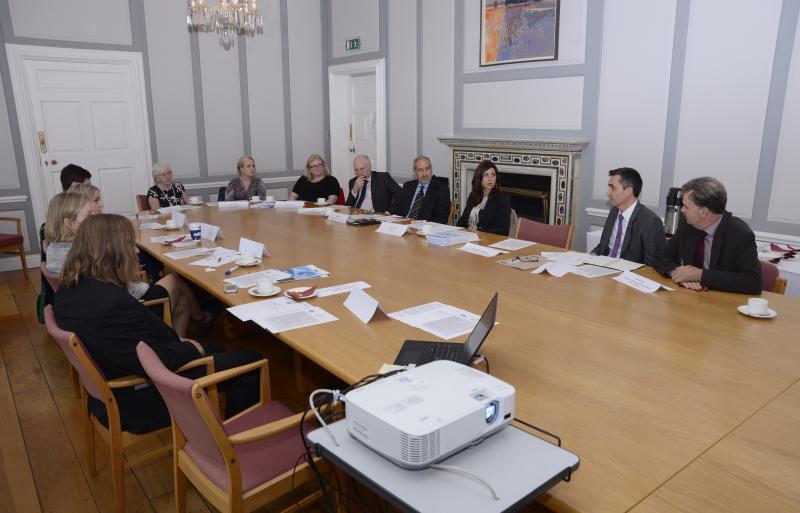
A high-level roundtable discussion on lifelong learning - spearheaded in 2017 by DCU’s Educational Disadvantage Centre in the Institute of Education - has proven to be the catalyst for a major EU policy forum on the topic being hosted in Brussels in May this year.
DCU Institute of Education’s Educational Disadvantage Centre organised and hosted a Roundtable on combining community lifelong learning centres and multidisciplinary teams led by the Director of the Educational Disadvantage Centre, Dr. Paul Downes, in September 2017.
This Roundtable was attended by the EU Commission, Minister for Children and Youth Affairs, Dr. Katherine Zappone TD; Cedefop (the European Union's European Centre for the Development of Vocational Training); Vice-President of the European Parents’ Association, Claudio Masotti; Tusla, Aontas, and Familibase Ballyfermot, and a range of other key stakeholders. Dean of the Institute of Education, Dr. Anne Looney, welcomed the participants.
Following on from that event, Cedefop is leading the organisation of an international policy forum in Brussels, What role for community lifelong learning centres? The potential of one-stop shops for preventing youth at risk from disconnecting, as part of the Romanian EU Presidency.
This event, which takes place on May 29, 2019, has been organised in conjunction with the Lifelong Learning Platform for Europe, representing over 40 European-wide civil society networks in the field of education, composed of 50,000 institutions and associations involved in lifelong learning in Europe.
A joint official briefing paper between the Lifelong Learning Platform for Europe and DCU’s IoE Educational Disadvantage Centre has been developed for the event, in dialogue with Cedefop, Implementing a Holistic Approach to Lifelong Learning: Community Lifelong Learning Centres as a Gateway to Multidisciplinary Support Teams.
Dr. Downes will be interviewed at the event, as well as giving an invited presentation on these issues. Participants in the EU event will also include representatives from the European Commission’s Directorate General, Education and Culture; Directorate General, Employment; and representatives from the Romanian and Finnish EU Presidencies.
REPORT PRESENTED TO FRENCH EDUCATION MINISTRY
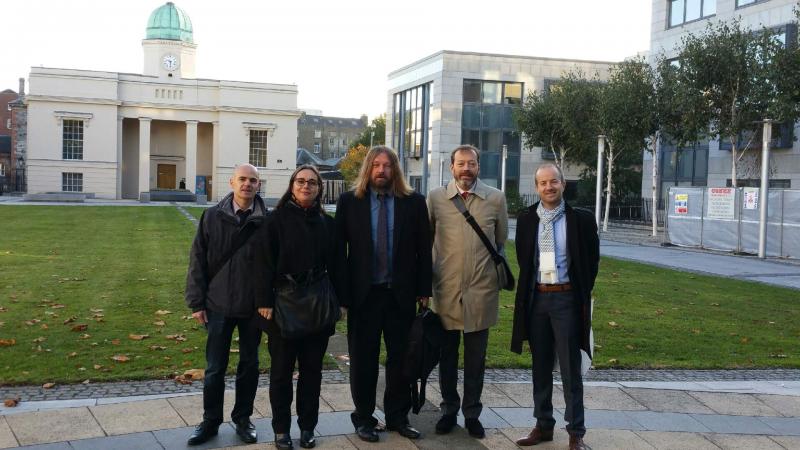
In October 2018, the Educational Disadvantage Centre, Institute of Education, hosted and organised a visit from a group of French secondary school principals from Zone d’Éducation Prioritaire schools in areas of high poverty in Paris. Their visit was to investigate aspects of a positive school climate in Irish DEIS schools and its role in early school leaving prevention. This followed on from Dr Paul Downes’ keynote presentation, Early school leaving: taking a holistic, differentiated and systemic international perspective on the issue, at the International Comparisons Conference on Early school leaving, jointly organized by the French National Council for Evaluation of the School System (CNESCO) and the International Centre for Pedagogical Studies (CIEP) Sorbonne Universities, Paris, 9-10 November 2017. In this presentation, Dr. Downes highlighted how school climate issues of a sense of belongingness were 50 percentage points below the OECD average for France in PISA, with regard to socio-economically marginalised students.
The French principals’ report to the French Education Ministry on school climate learning from Irish contexts based on their visit can be accessed HERE
EDUCATIONAL DISADVANTAGE CENTRE: MCVERRY TRUST FUNDED STUDY ON HOMELESSNESS
The Educational Disadvantage Centre, Institute of Education, DCU has received funding from the McVerry Trust to undertake a study on young homeless men’s experience of education. The study will be undertaken by Sarah Murphy, Grainne McKenna and Dr. Paul Downes.
The research will examine experiences of young homeless men aged 18-35 availing of emergency or temporary accommodation with the McVerry Trust. It will focus on their educational experiences and school supports with a view to making policy recommendations that will inform preventative strategies and existing supports for young men at risk of or experiencing homelessness in Ireland. Teachers, School Principals and Home School Liaison Teachers will also be interviewed.
INTERAGENCY ACTION PLAN 2019-2021 FOR CHILDREN AND YOUNG PEOPLE IN DUBLIN NORTH WEST INNER CITY
In his role as Chairperson of the Steering Committee of the Area Based Childhood Programme in Dublin North West Inner City, funded by the Department of Children and Youth Affairs, Dr. Paul Downes, Director of the Educational Disadvantage Centre, Institute of Education, DCU has helped lead the community consultation process that informed the new Interagency Sustainability Action Plan 2019-2021 for Children and Young People in the area.
The Interagency Action Plan, devised after a year-long series of local community stakeholder consultation processes, was launched by Minister for Finance, Paschal Donohue in November 2018. An implementation committee is being established to progress the Action Plan recommendations. The Area Based Childhood Programme consortium for the Dublin North West Inner City consists of 32 local services, including community groups, schools, crèches and statutory services.
Dr Downes spoke at the launch to emphasise the importance of key recommendations in the Action Plan such as local community one stop shop hubs, combining multidisciplinary teams and community lifelong learning centres, mental health services, domestic violence support services. These bridge health and education needs, through a community development vision. He also emphasised the finding in the Action Plan regarding how local community services need new spaces and are under pressure from rising rents.
Minister Donohue welcomed the Action Plan and committed to engage in further dialogue towards consideration of implementation of its findings. Ms Eadaoin Kelly, Principal, St. Mary’s DEIS Primary School, Dorset St. also spoke at the launch. Ms Kelly is a graduate of St. Patrick’s College, undertaking her elective minor specialism with the Educational Disadvantage Centre.
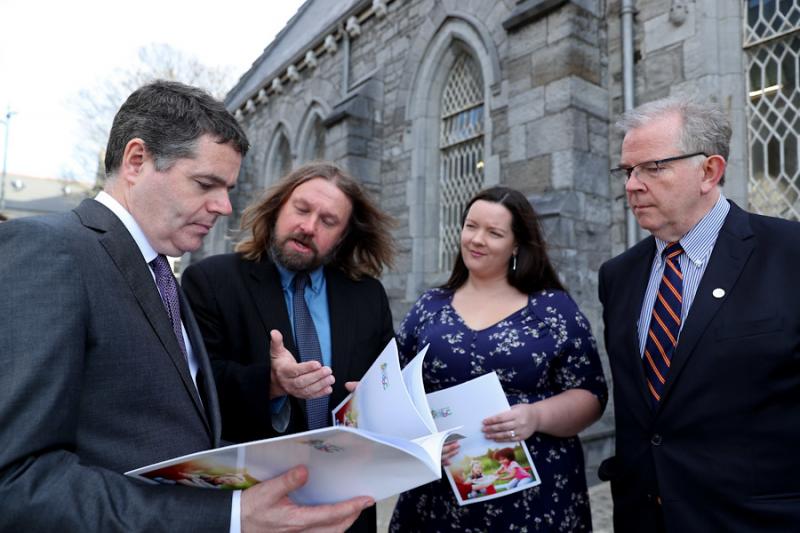
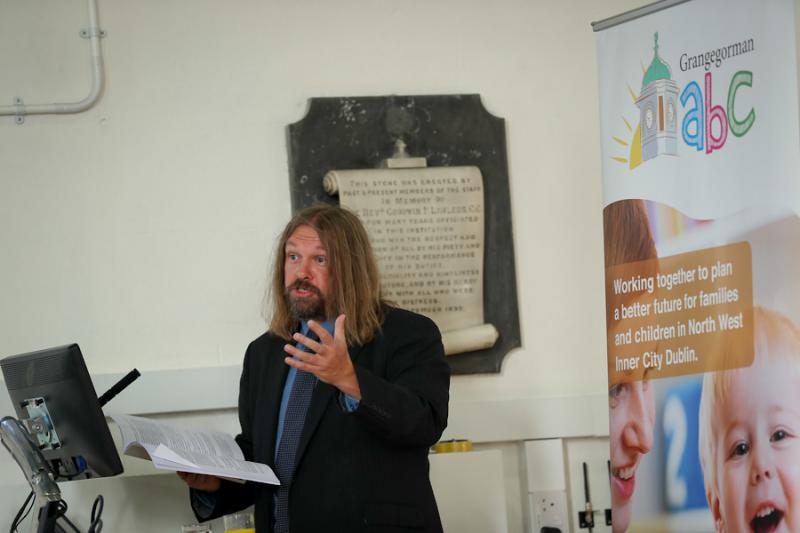
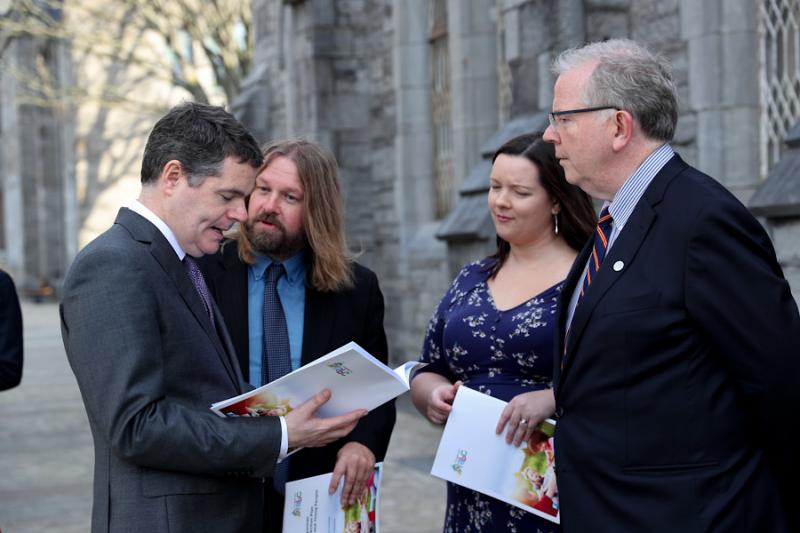
EDC RESEARCH FELLOWSHIP ON PRISON EDUCATION
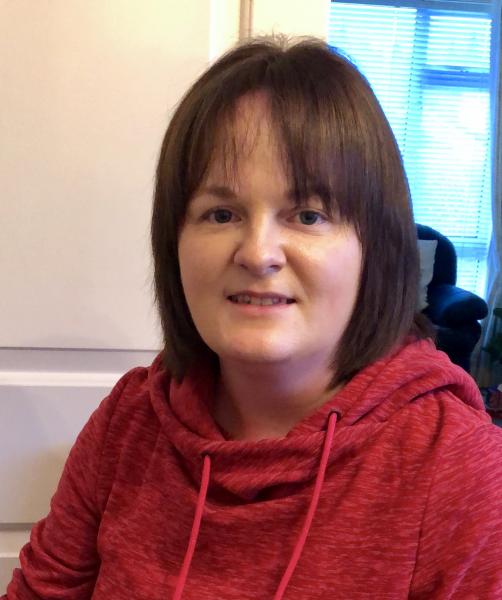
Claire O'Connell is the successful recipient of the Educational Disadvantage Centre Research Fellowship on Prison Education funded by the Irish National Prison Service. The three year fellowship is in the area of prison literacy and prisoners' perceptions of education in prison. Claire works as a teacher and guidance counsellor with the City of Dublin ETB Education Service to Prisons. She completed her BA in NUI Maynooth in 2000, and also studied for a Postgraduate Diploma in Adult and Community Education there in 2008. In 2013 she graduated with a Masters in Education from Trinity College Dublin, specialising in Educational Guidance and Counselling. The primary focus of her M. Ed research dissertation was the field of prison education, exploring the role of guidance counselling in facilitating the successful transition of prisoners back into the community upon release. As a first year PhD student with the Educational Disadvantage Centre in the DCU Institute of Education, she is currently carrying out research into literacy levels and participation in education programmes in prisons across Ireland. The literacy and language competencies of prisoners are being assessed as part of a study focussing on the educational needs of those held in custody commissioned by the Irish Prison Service.
PUBLICATION OF TWO NEW PEER REVIEWED JOURNAL ARTICLES FROM THE EDUCATIONAL DISADVANTAGE CENTRE
Hargadon, C. & Downes, P. (2019). The neglected issue of sleep: A curricular and home-based intervention for improving sleep patterns among sixth-class children in an Irish urban school with high levels of poverty. Irish Education Studies (forthcoming, accepted for publication)

